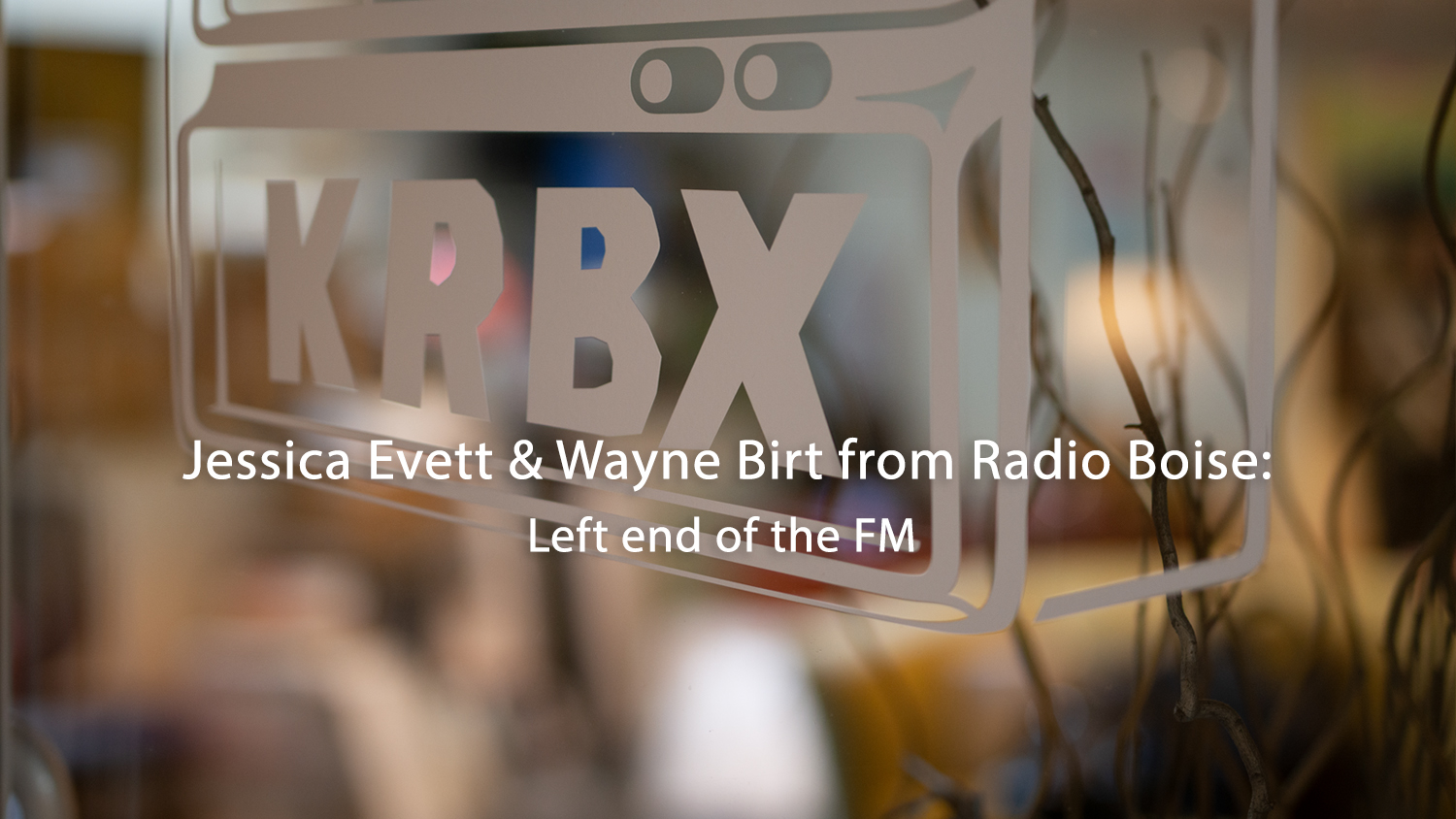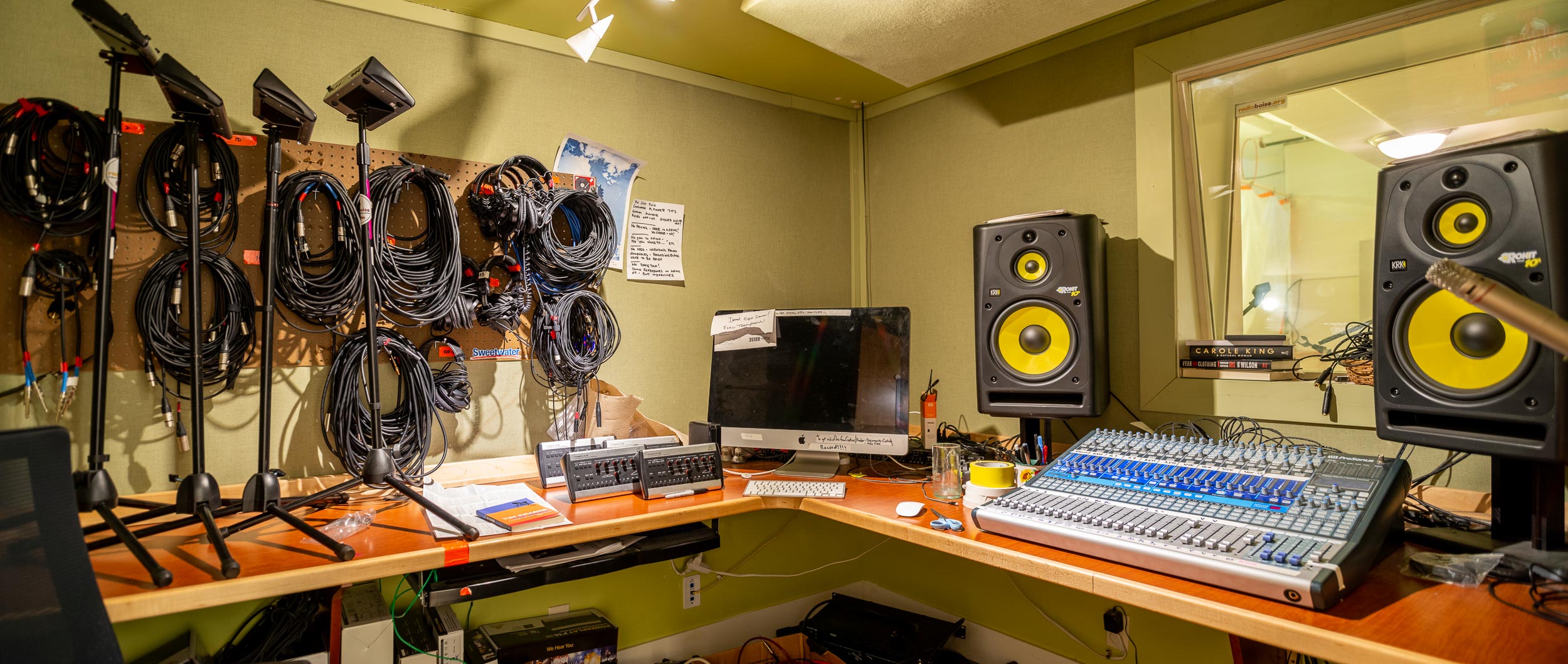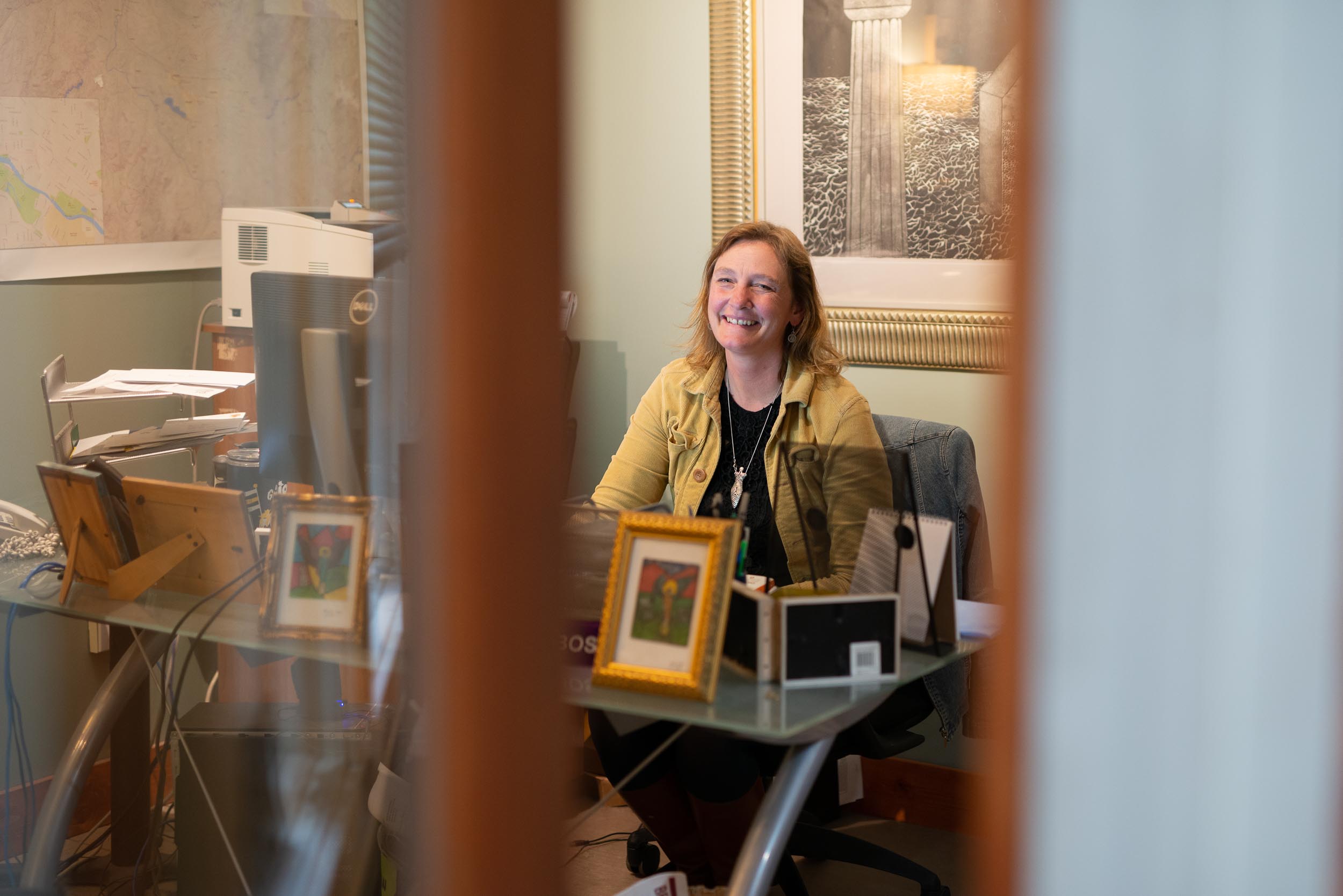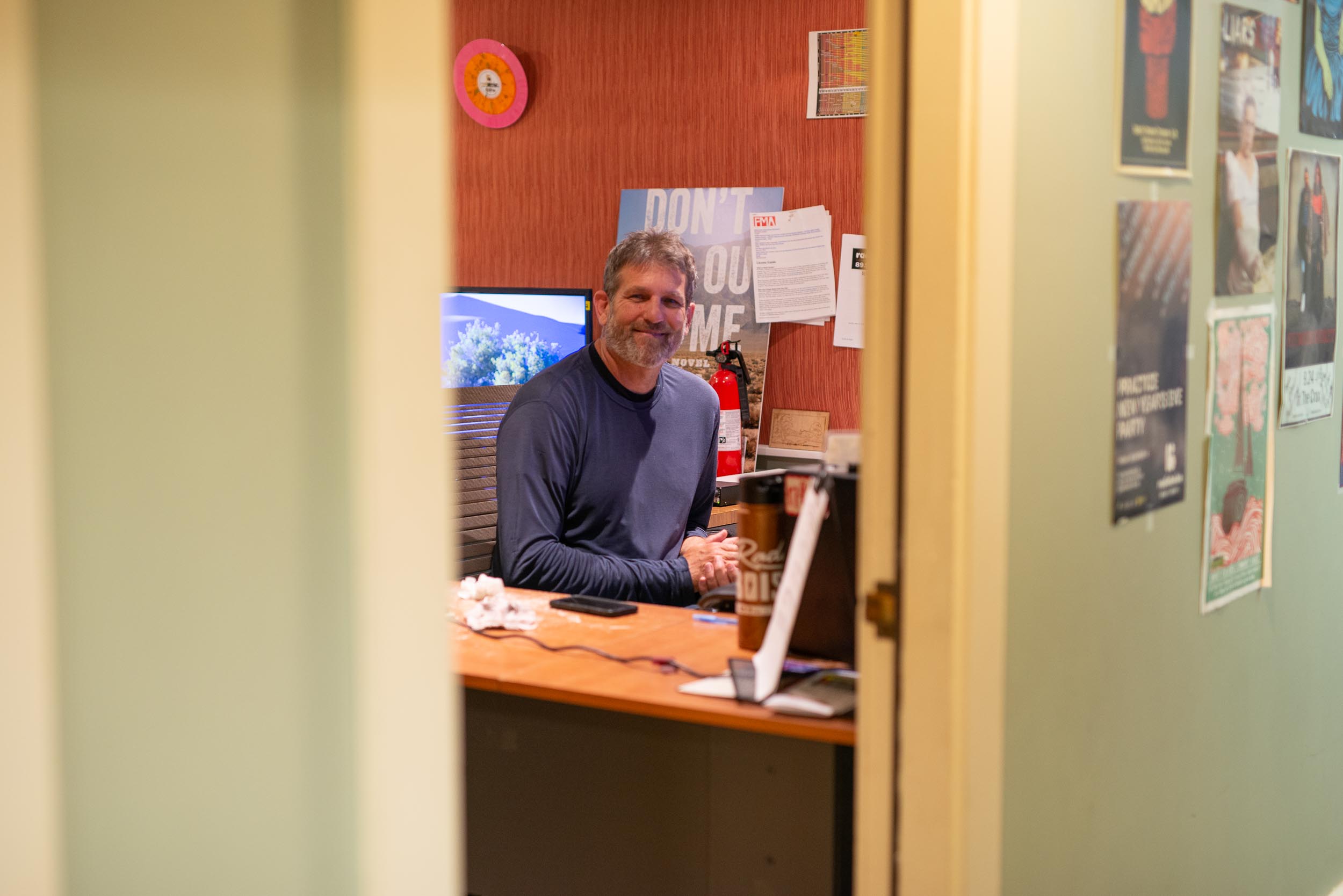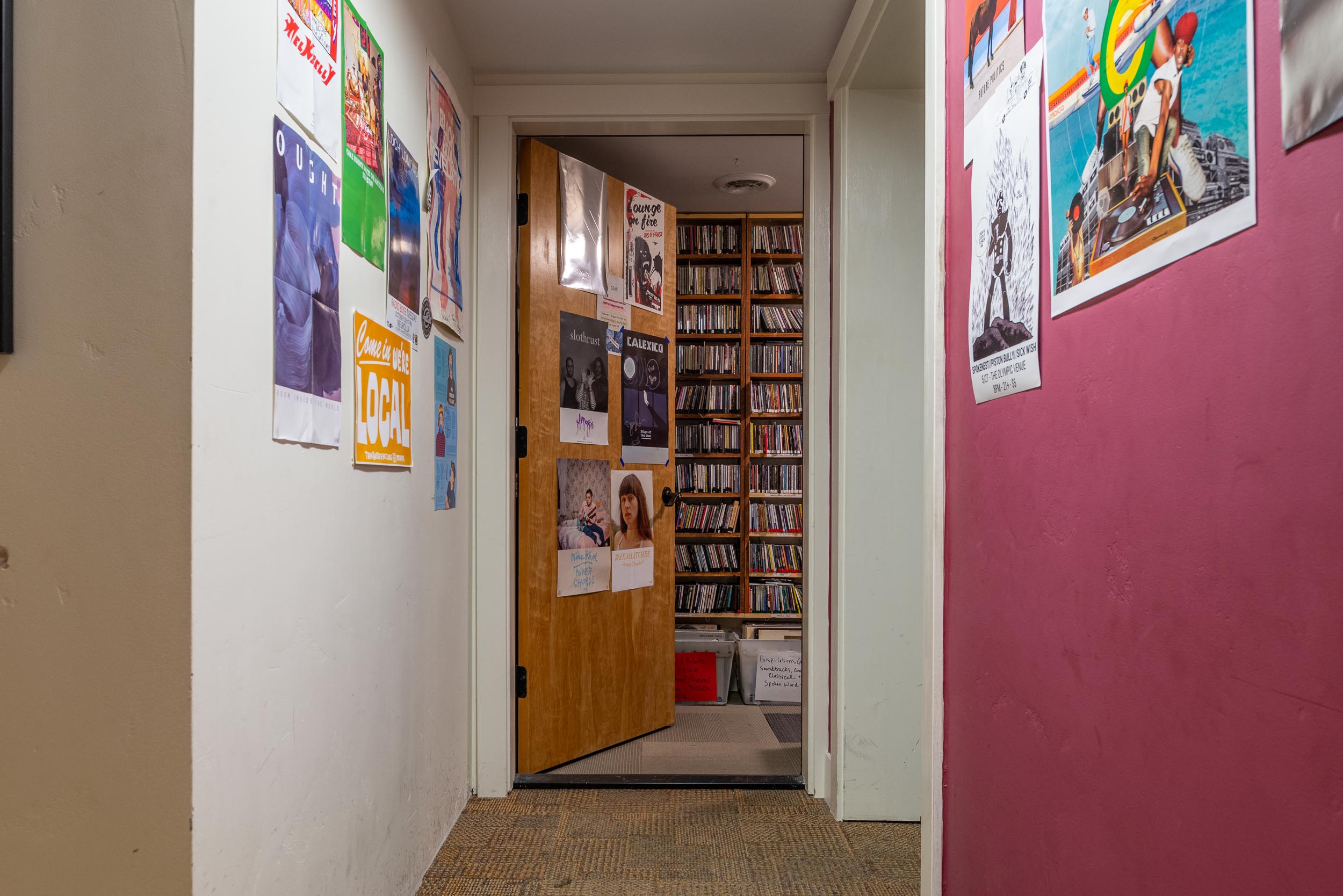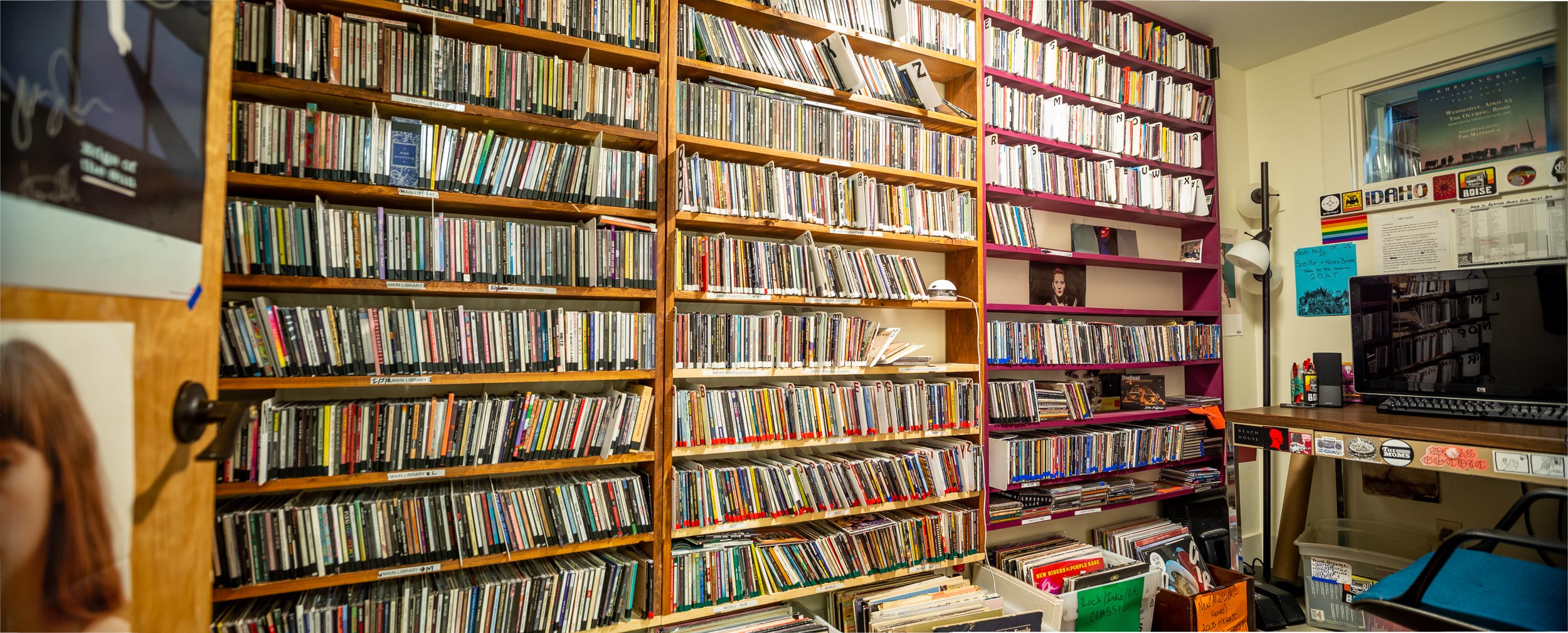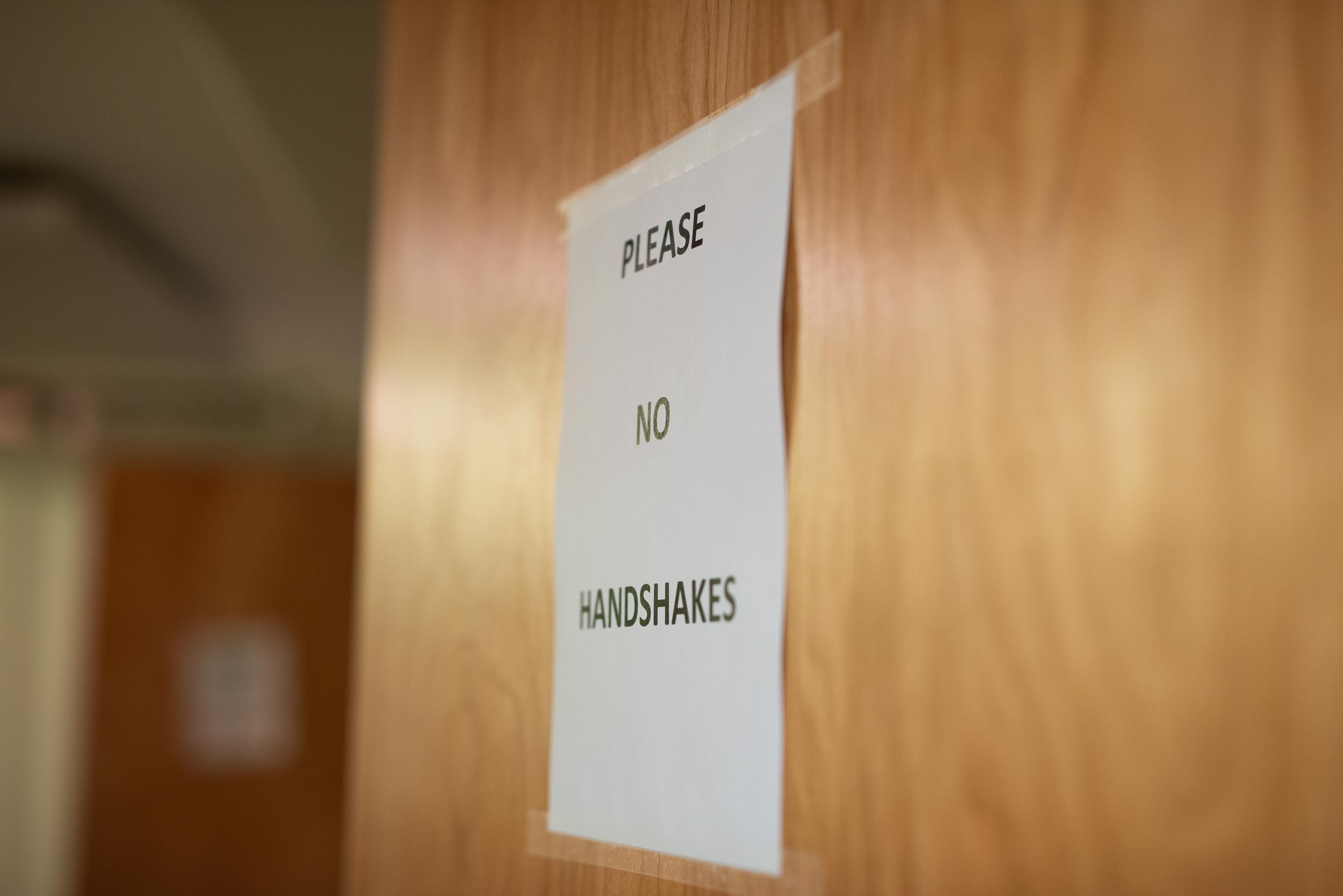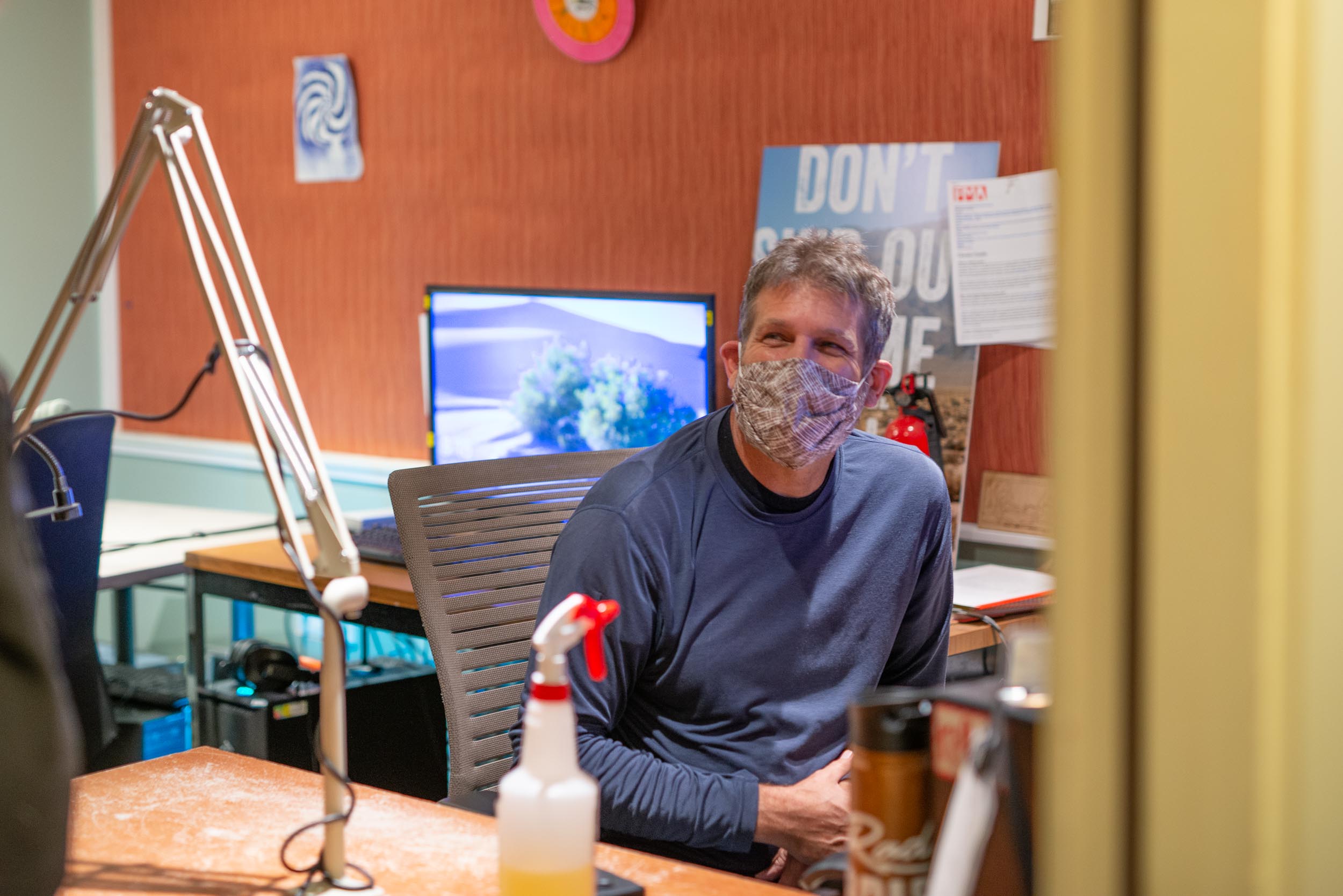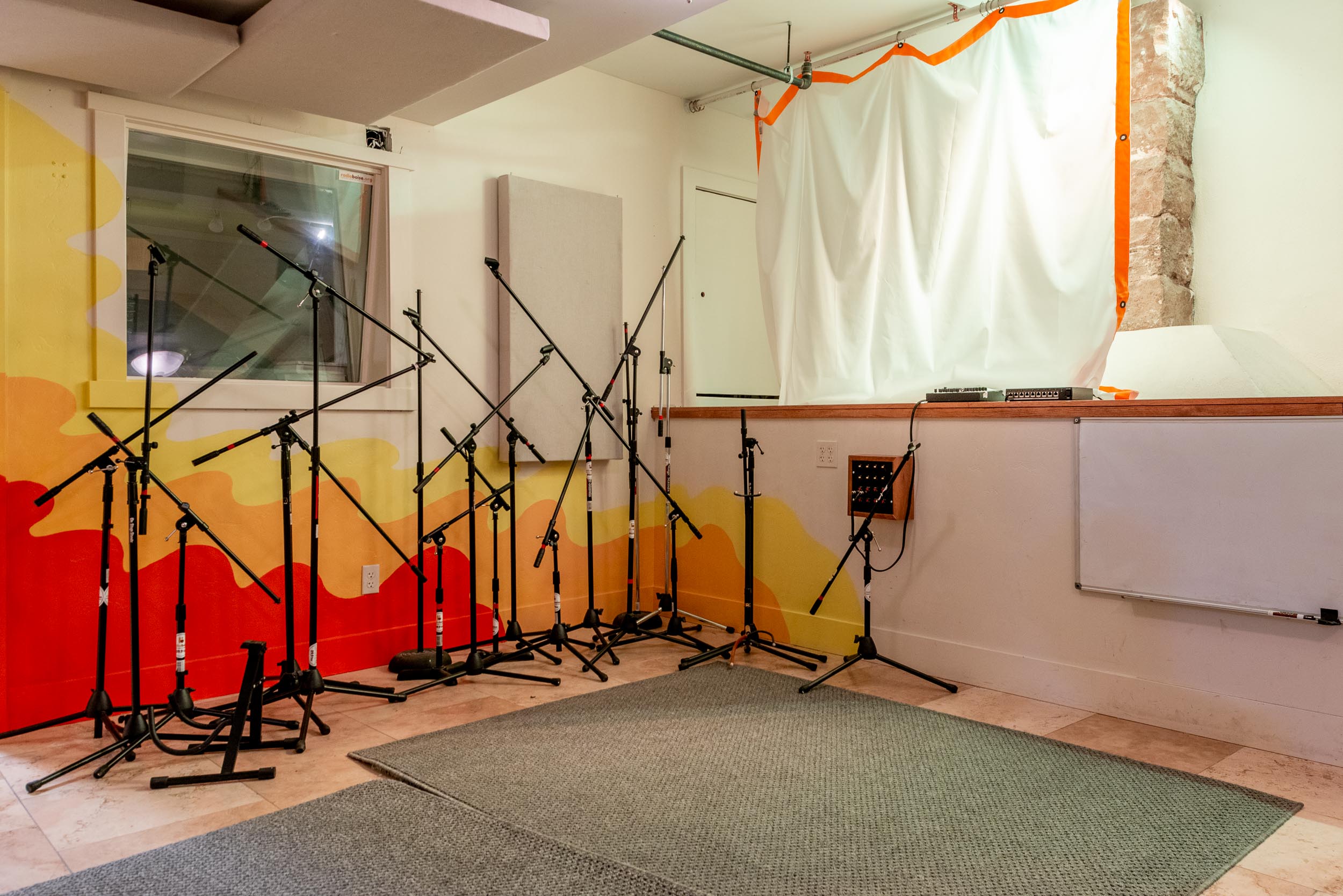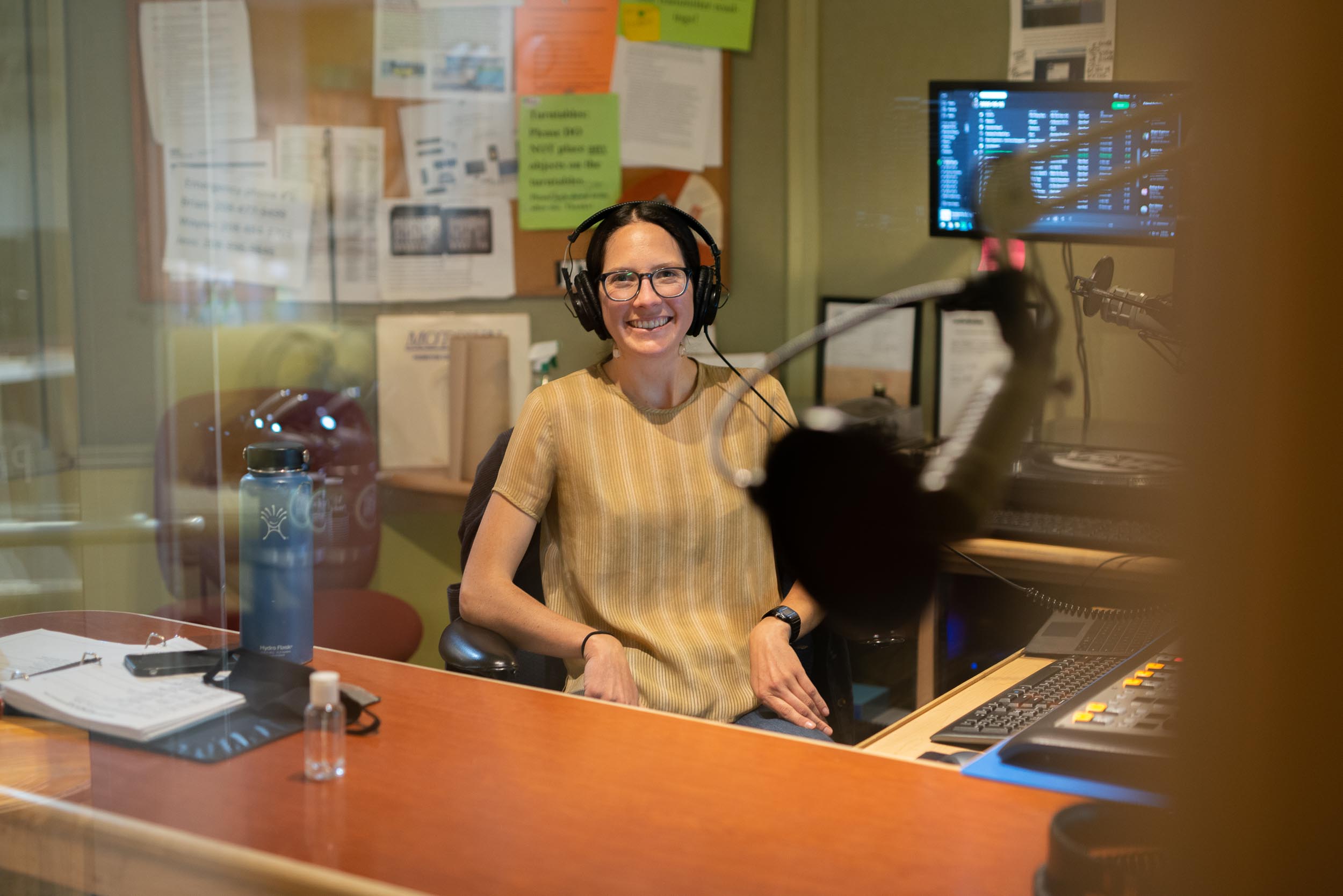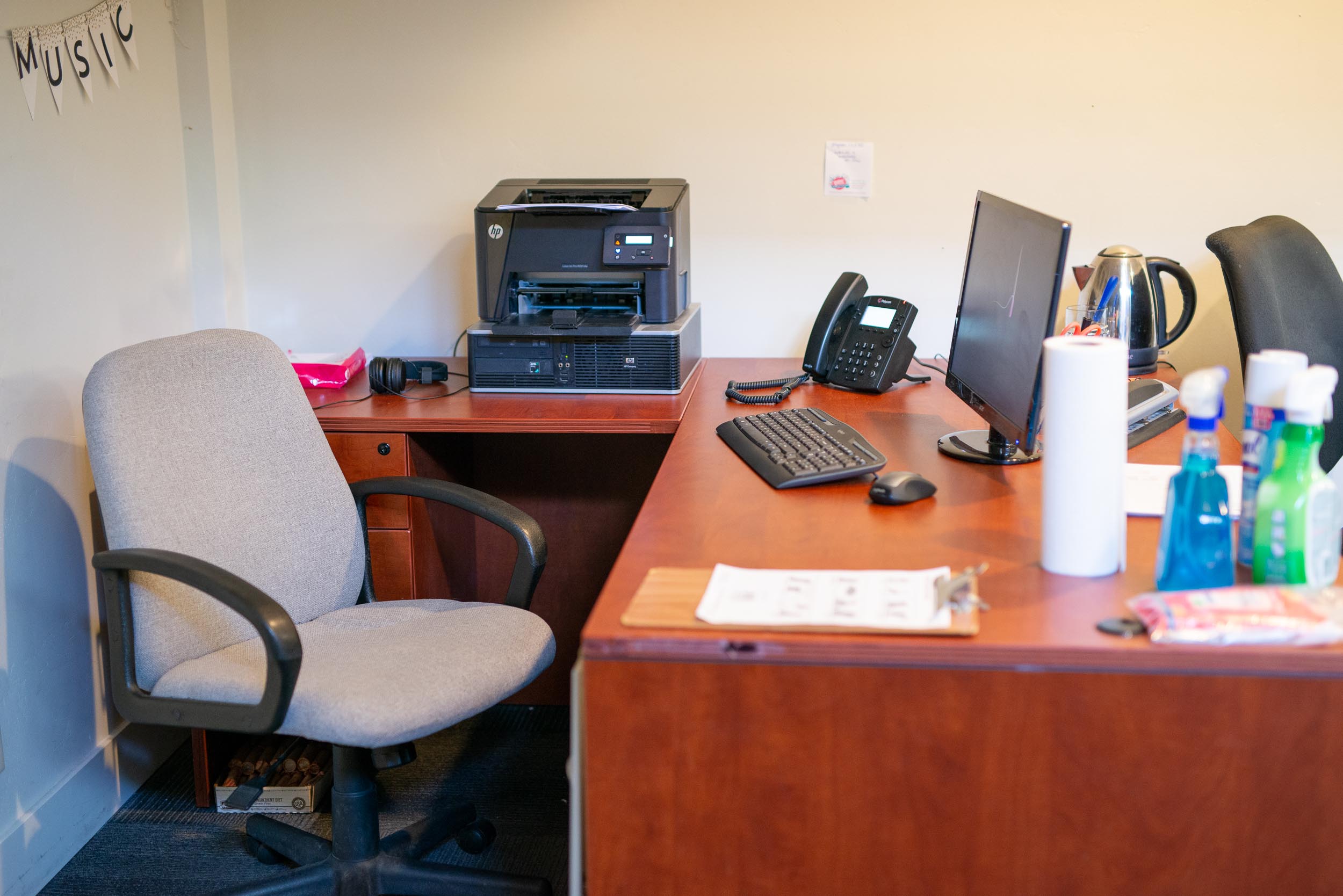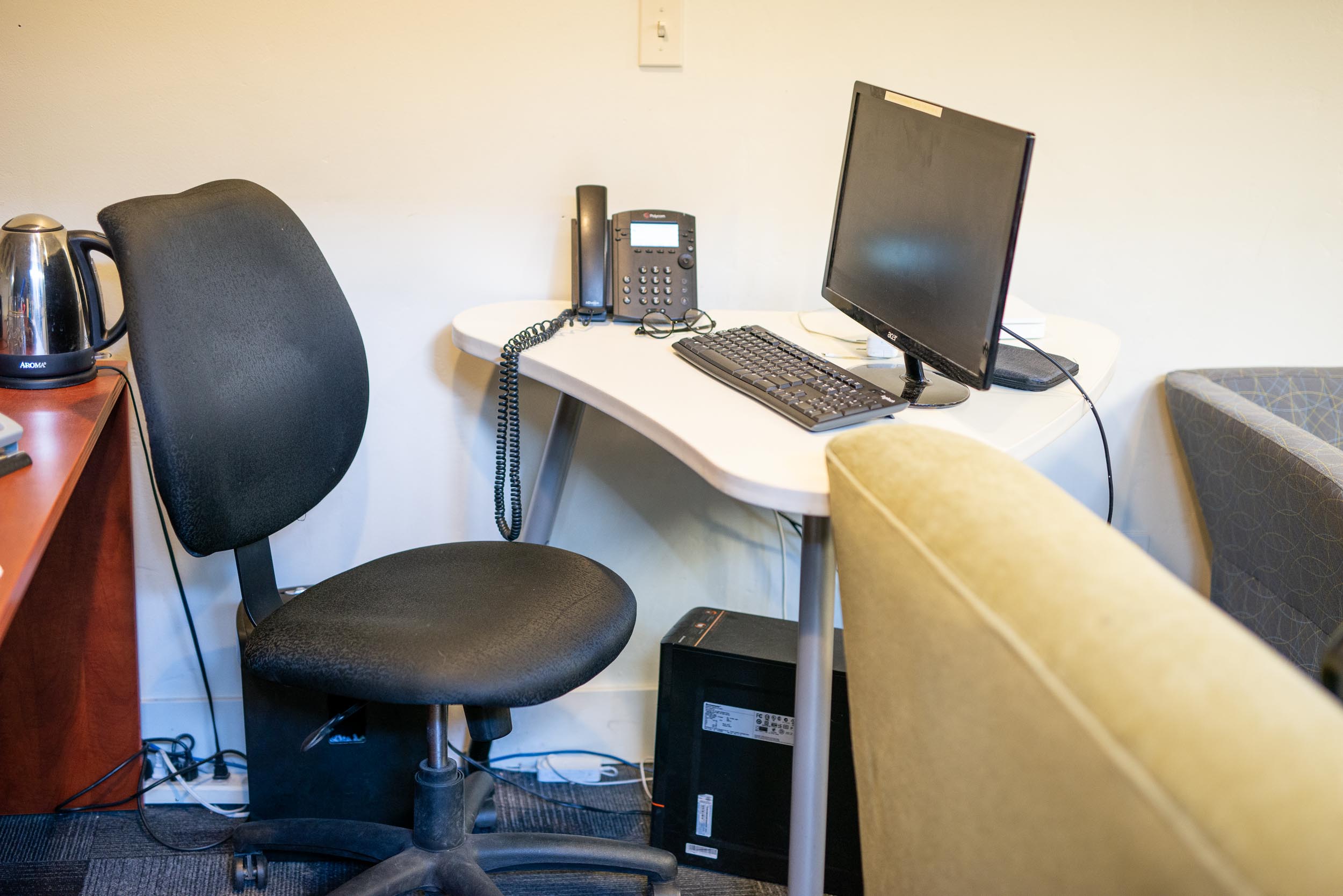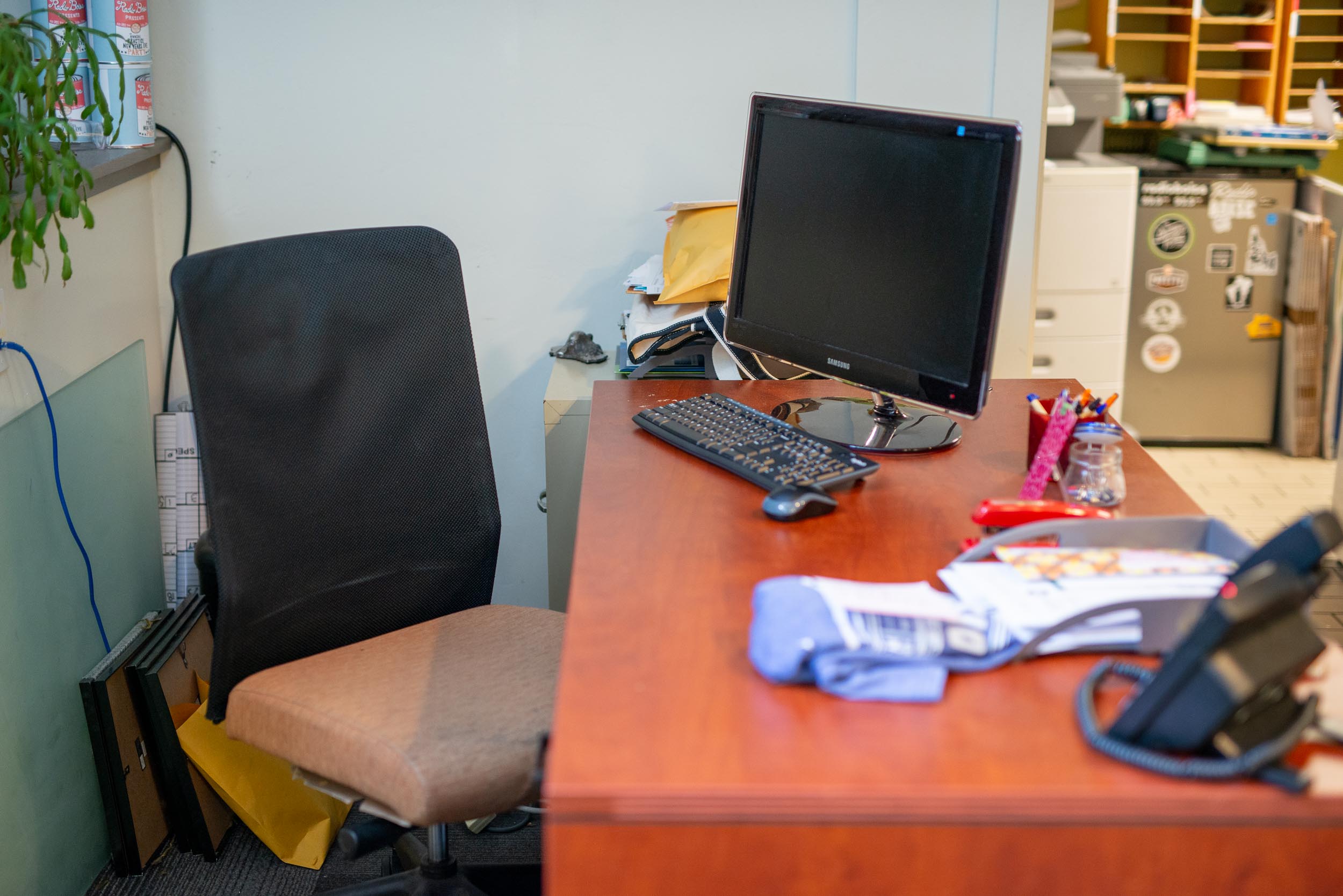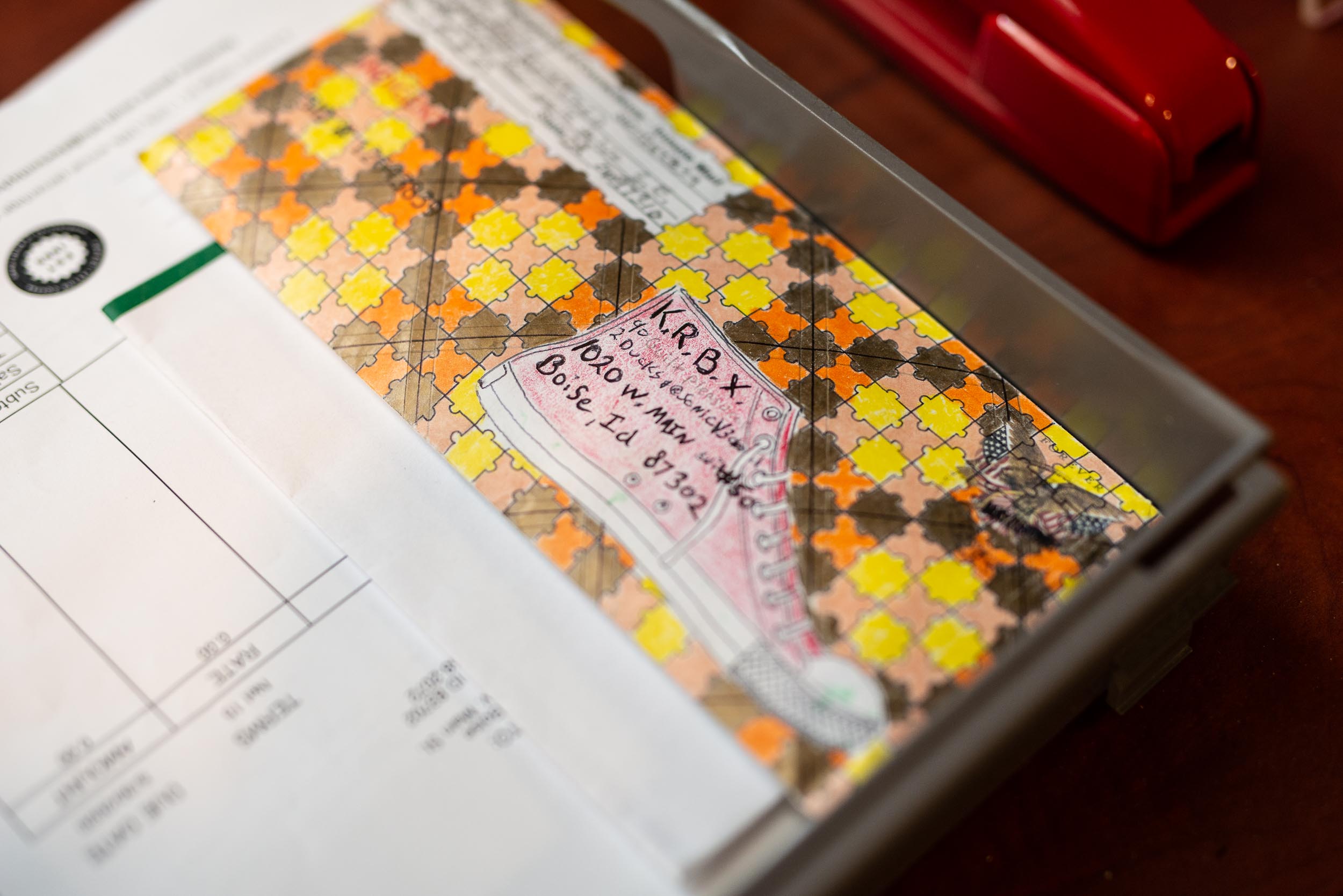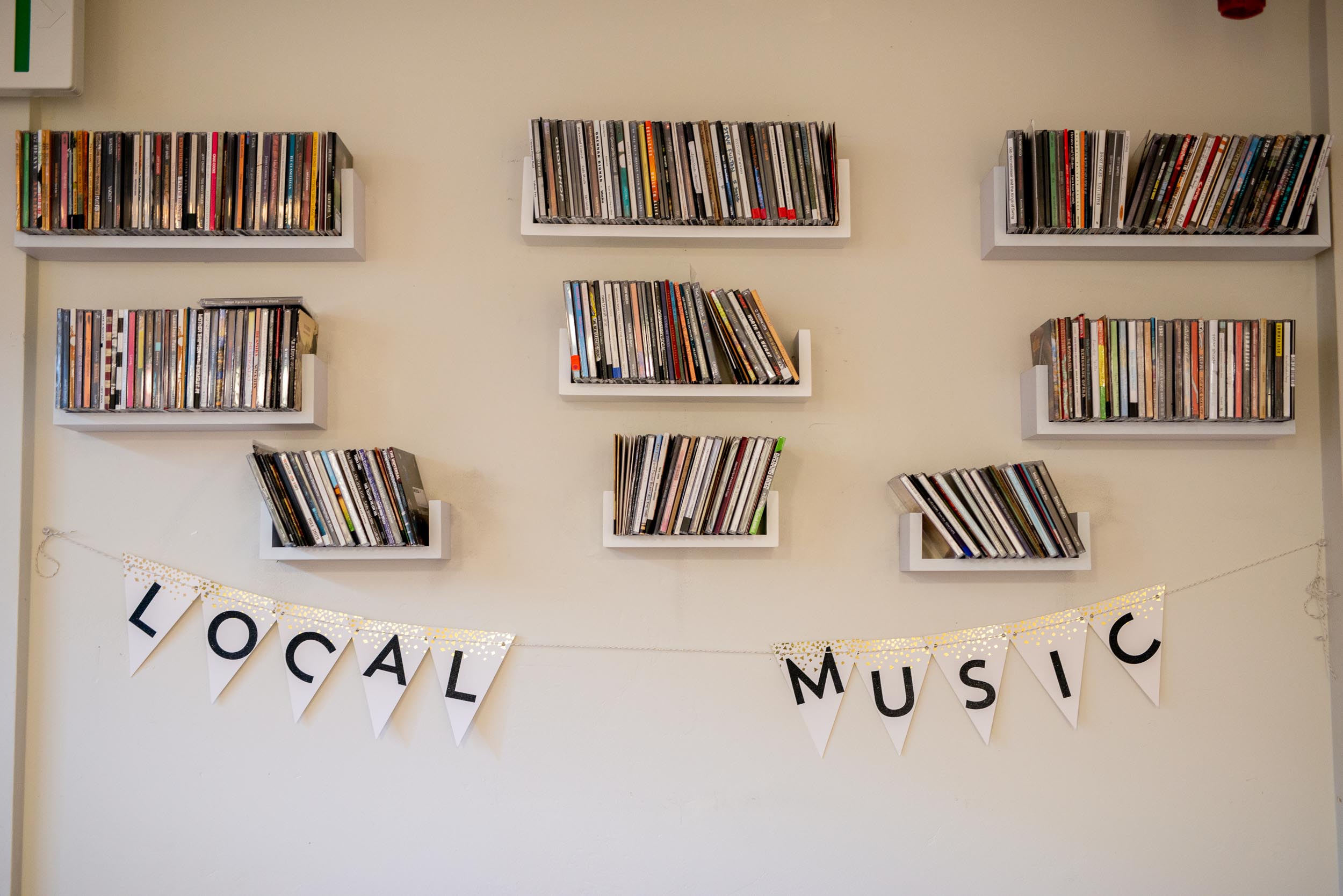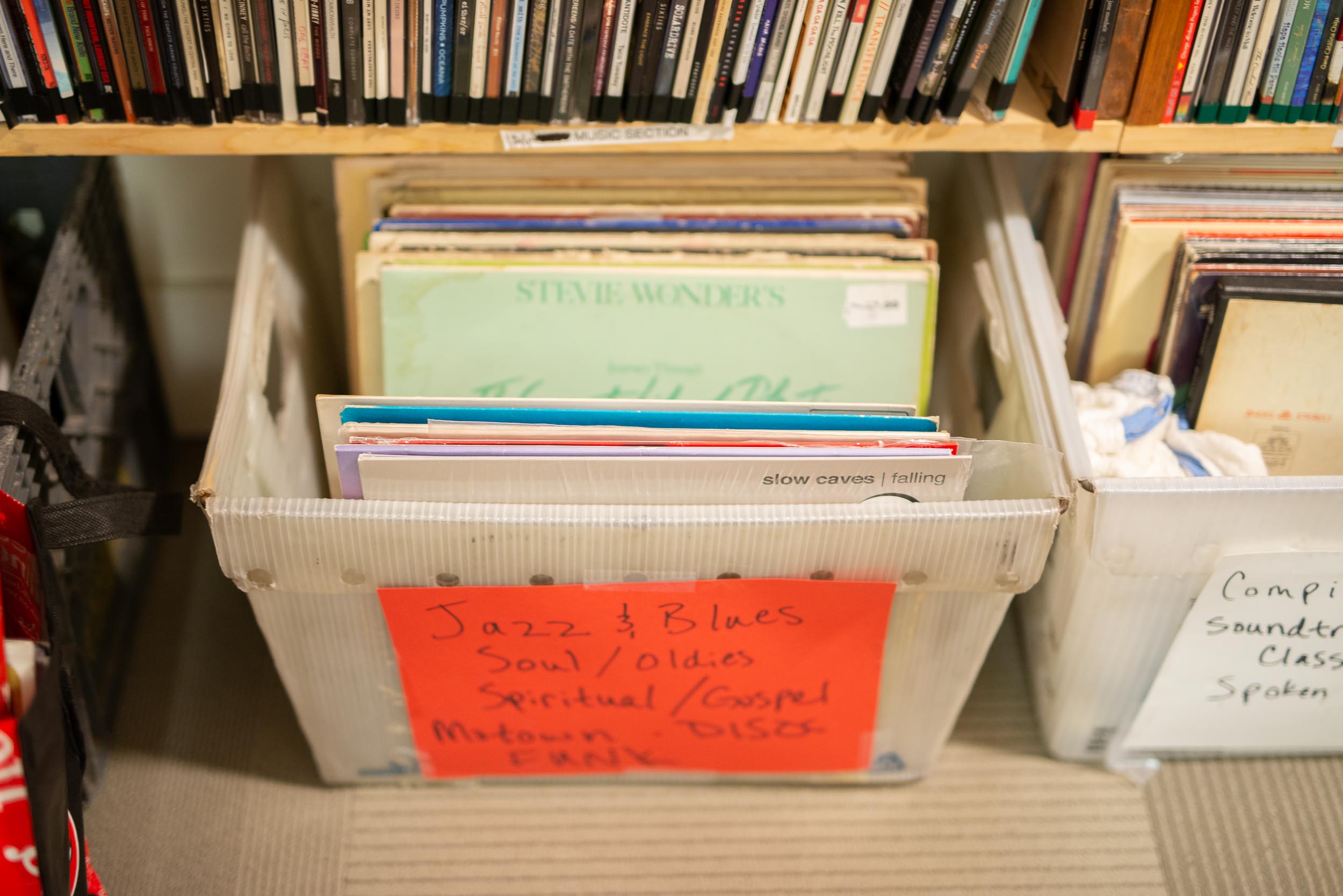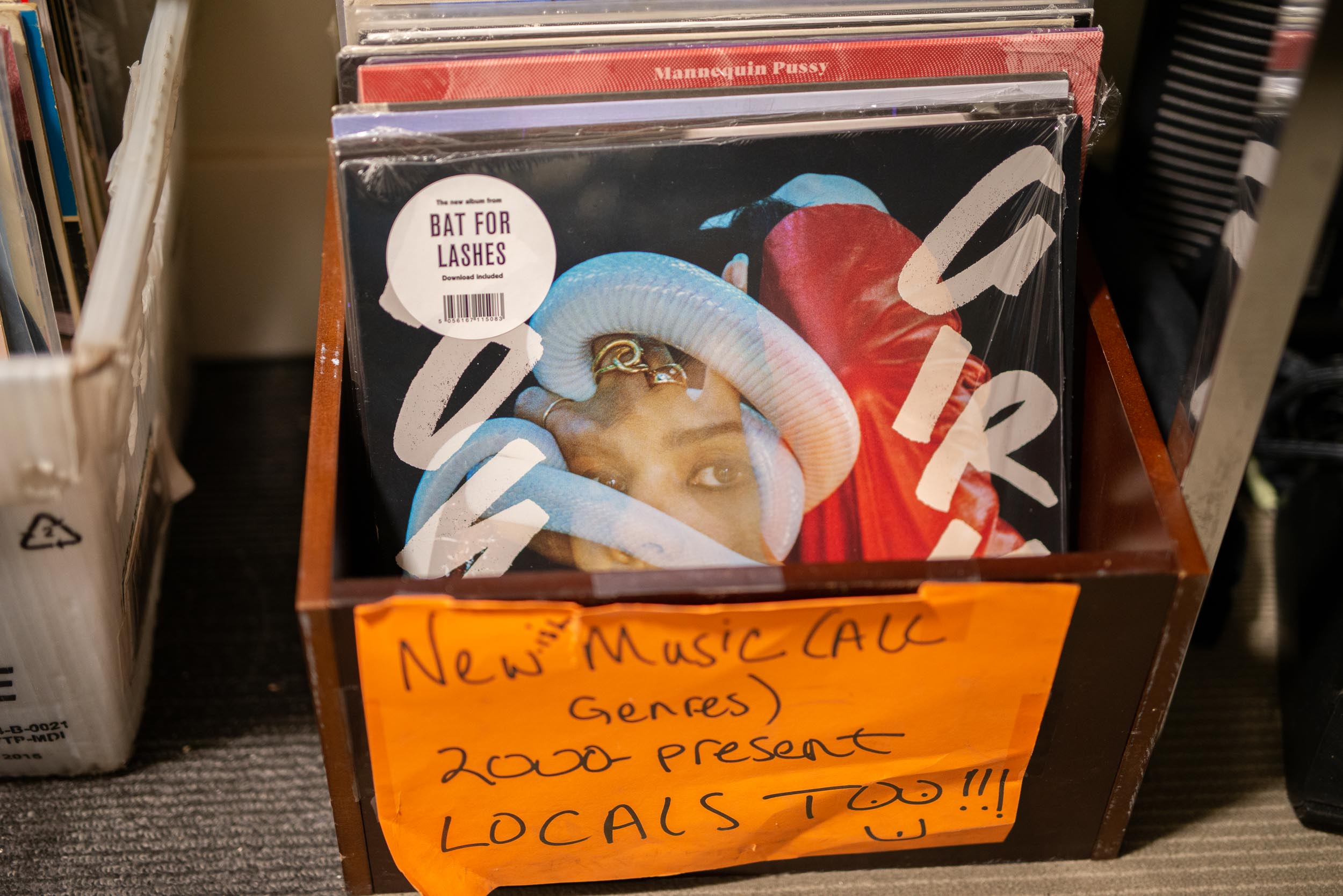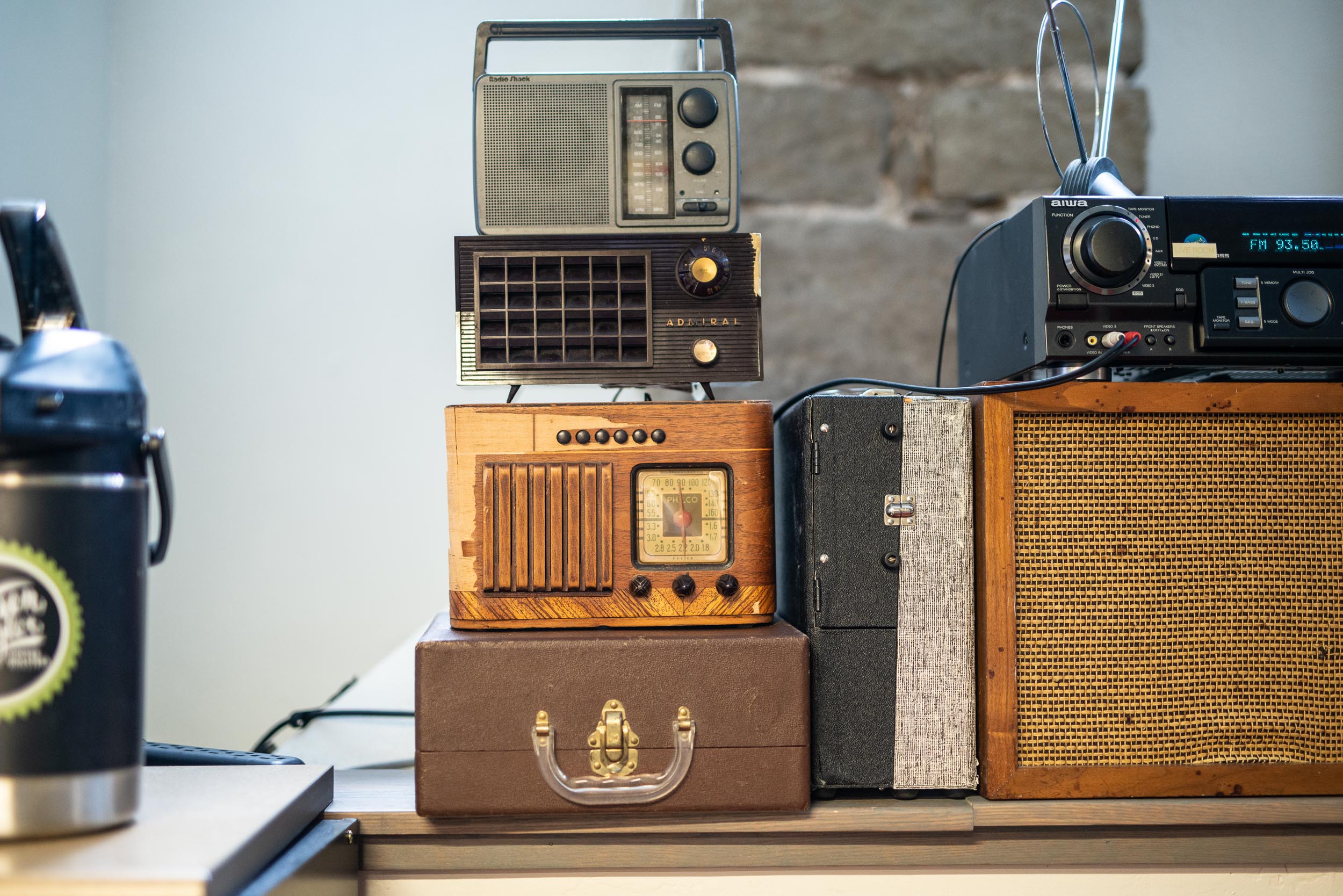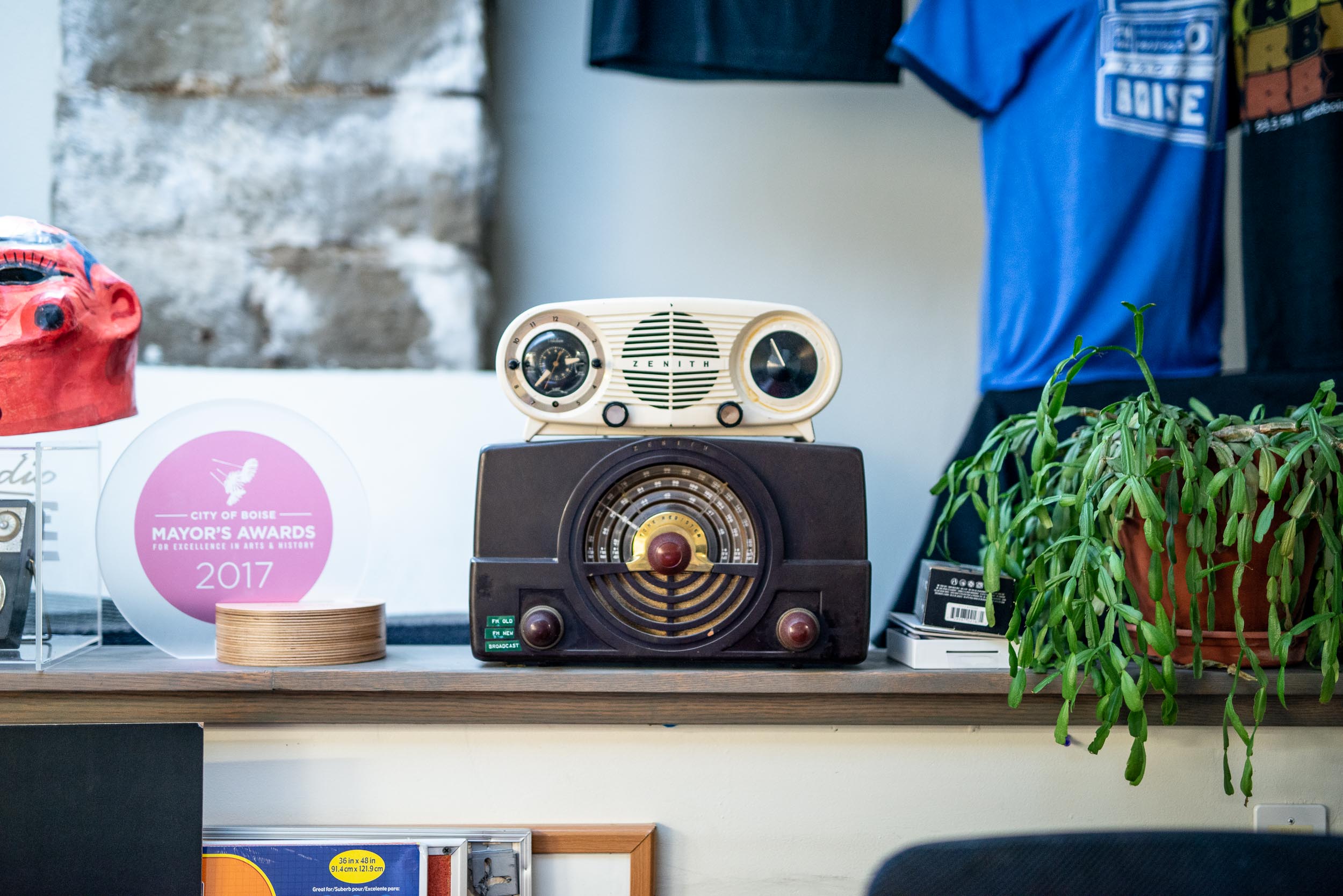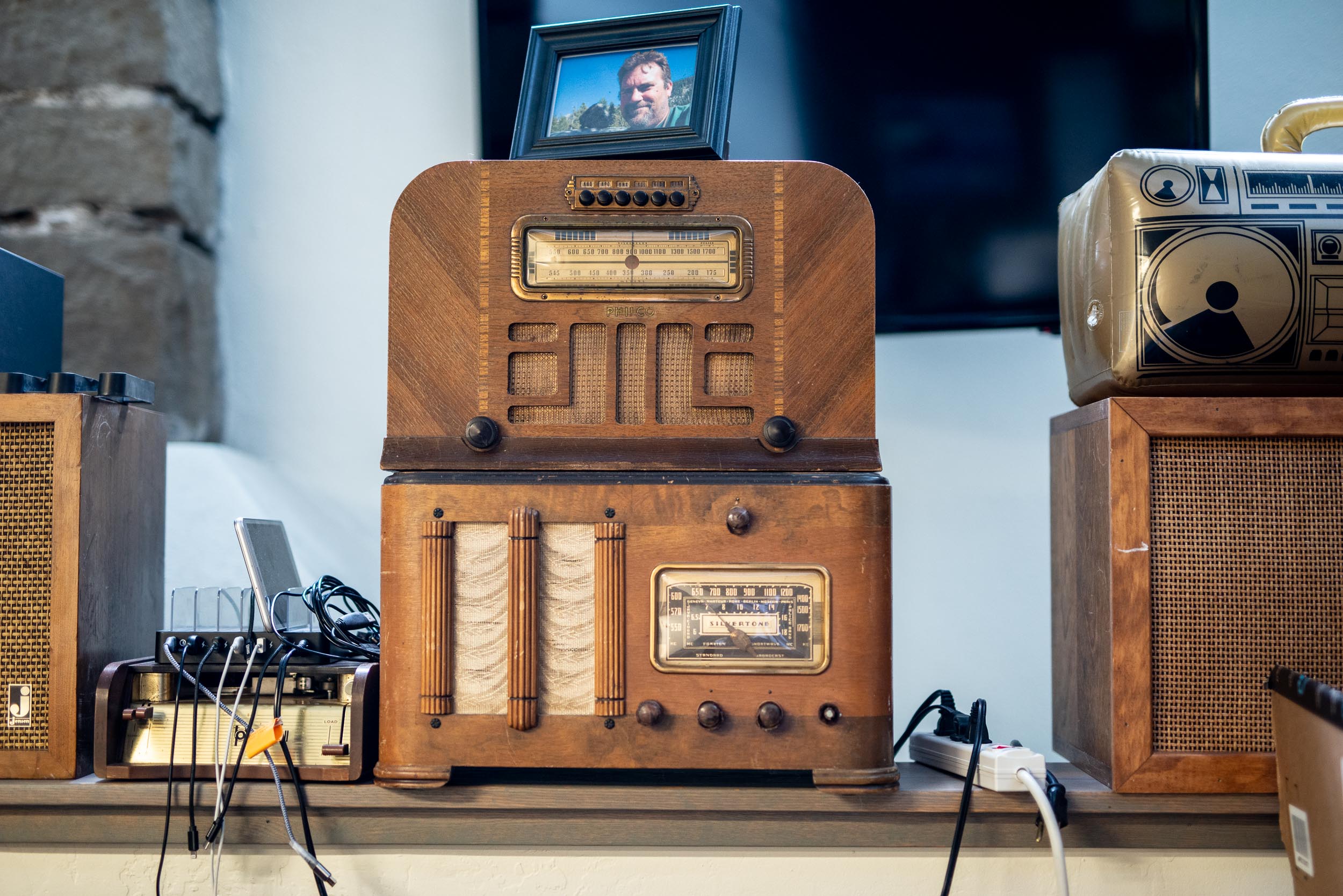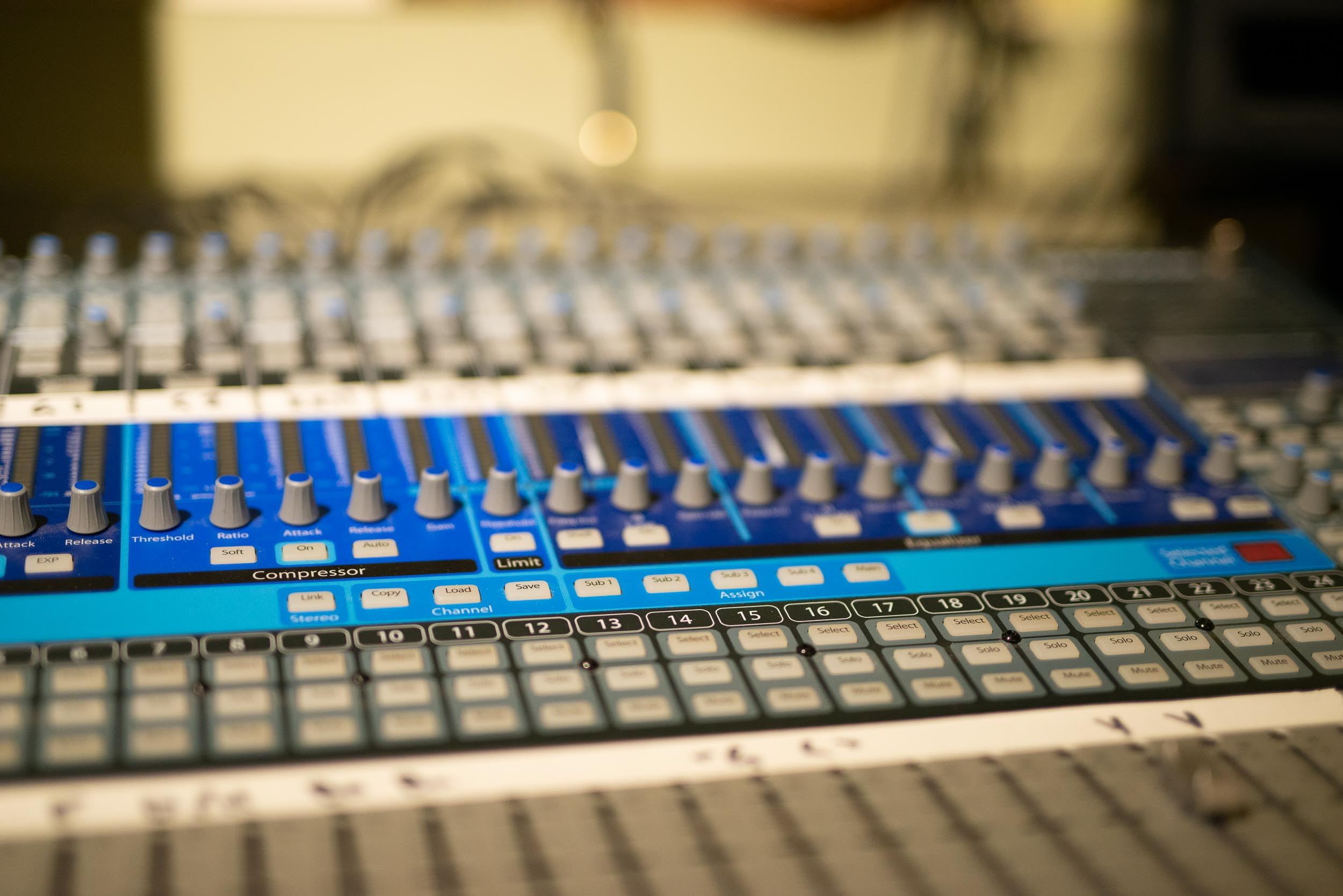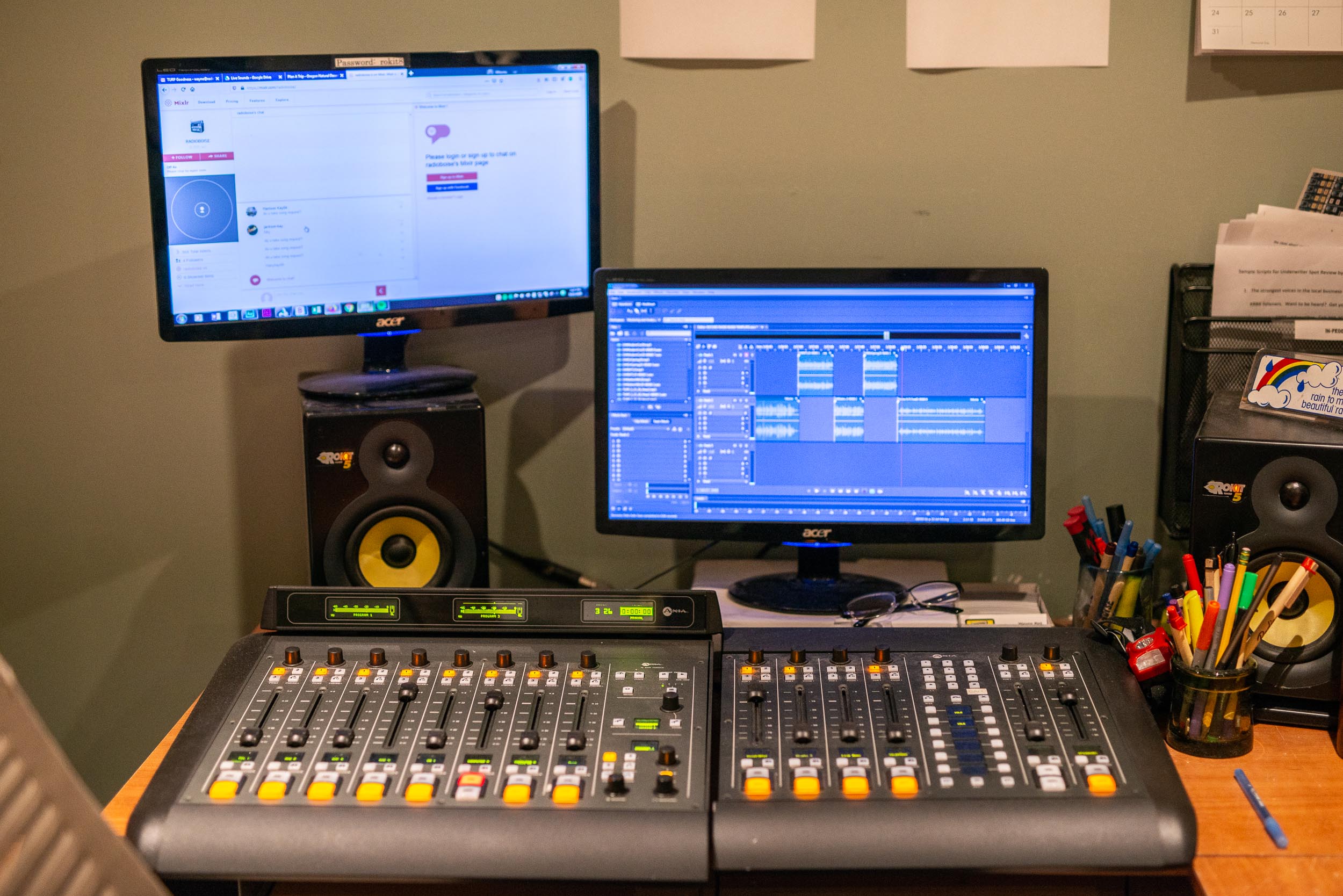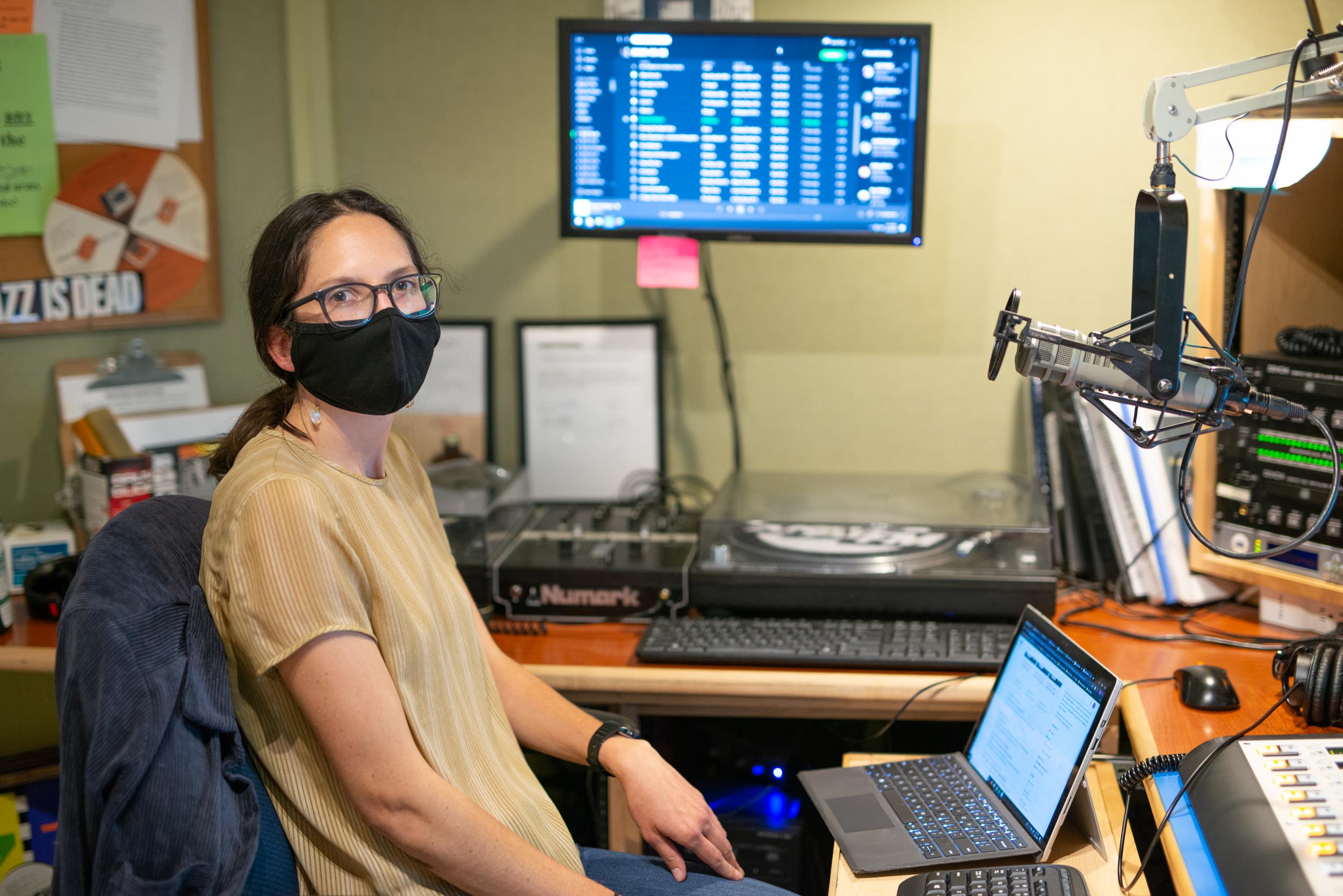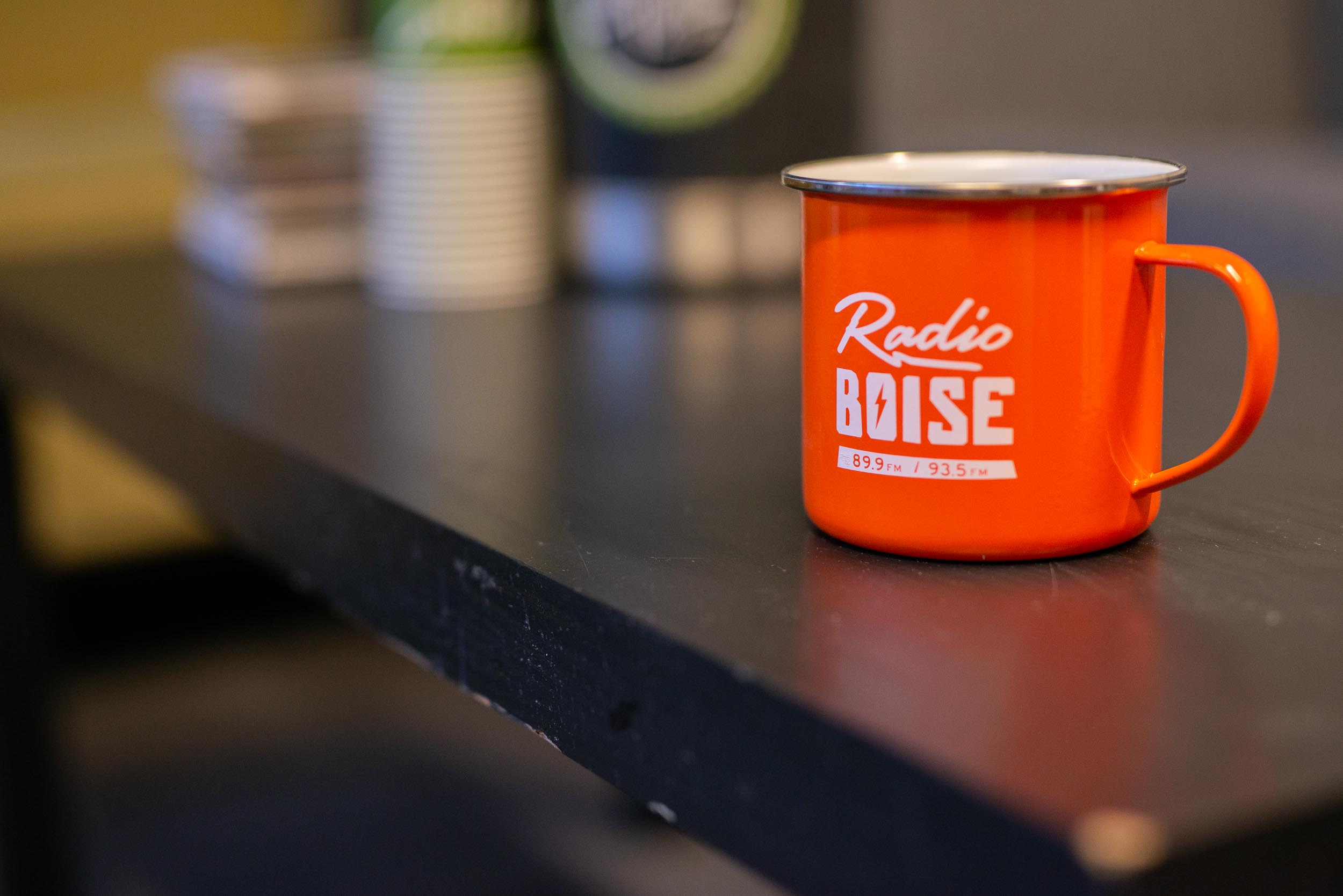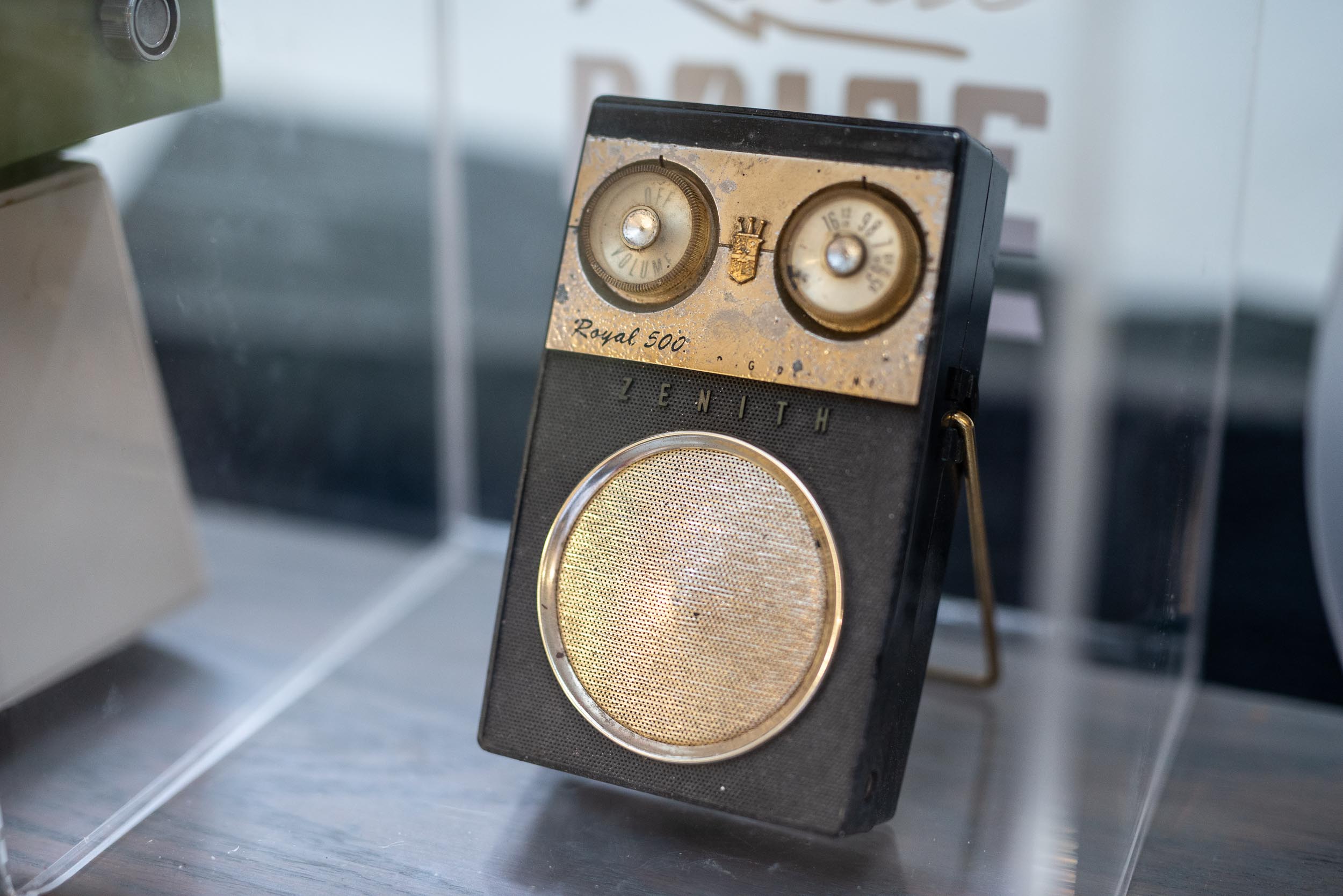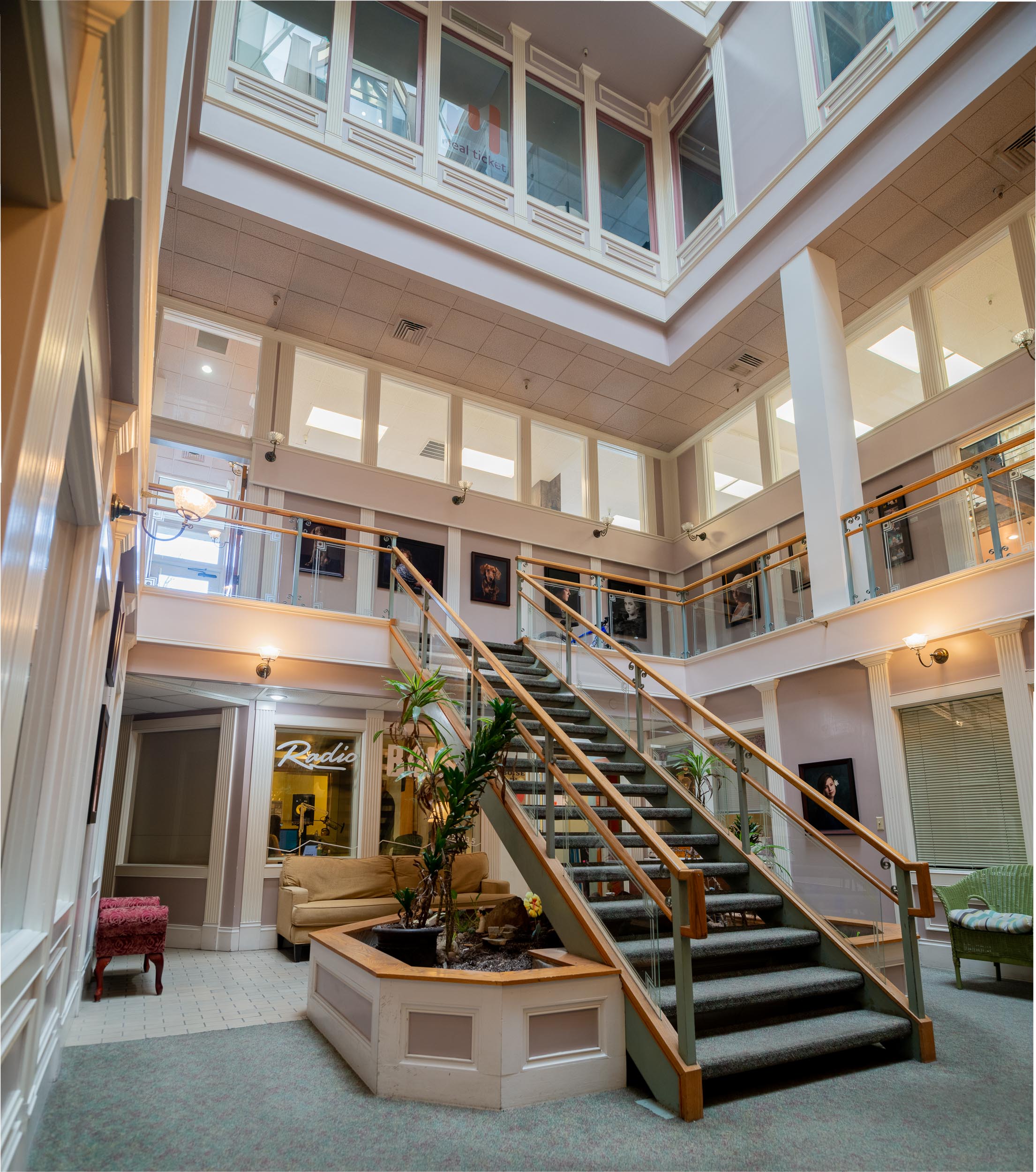Creators, Makers, & Doers: Radio Boise
Posted on 5/27/20 by Brooke Burton
Interview & Photography by Brooke Burton © Boise City Department of Arts & History
Radio Boise’s General Manager Jessica Evett and Program Director Wayne Birt chatted with us over the phone during the early stages of COVID-19, describing exactly why community radio is the perfect medium for expressing the complex emotions that come along with a pandemic. What makes Radio Boise magical? Freedom of expression going out over the airways from DJ to listener without the weight of corporate expectations or the traps of convention. The programmers set the tone, curating shows that reflect a wide variety of perspectives and backgrounds. Read on to find out if you are a listener or a non-listener, what it means to have “the bug” and what the Radio Boise “type” is (hint: there isn’t one). Oh! And check out our Q&A with DJs: Tgoss, Sage, Chris Tansey, Roin Dig, Sadie Mayhem, Nichole Marie, and Wendy Fox; we ask about unusual moments on air, encounters with fans & musicians, and of course, inspiration.
You can listen to the full interview with Jessica and Wayne on Soundcloud HERE
I’m going to start at the beginning: how is community radio different from commercial radio?
WB: Commercial radio tends to sell moods. And, obviously, it exists for profit. We’re a nonprofit organization. What we try to do, rather than guess, from a marketing standpoint, what people are going to like, is take members of the community and let them create the taste. Our DJs are community members. It’s kind of a crazy quilt as a result.
During the pandemic, your programmers are still working and putting on their regular shows, from home?
WB: Absolutely. And rather than trying to come up with a generic message as to how to program during the pandemic, our programmers do that work because they have an array of emotions. They program depending on how they feel and what they see going on out there. You get all these perspectives, to a much greater degree, than commercial radio.
Wayne, you and I talked a lot the other day about the kind of personal connections that can happen through this medium, particularly in times of duress?
WB: Yeah, I can’t really avoid taking an emotional temperature of the place. It’s really interesting to me how a lot of shows have expressed themselves. I think Grant Olsen is a really good example of that. He does a show called “It’s Now Right Now,” he took sort of a nurturing approach, played kind of softer, comforting music; whereas, we have a couple other DJs who want to deliver pure escape, “Let’s have a social distance dance party. Let’s ratchet up the volume of the music, let’s have a lot more fun.” In between, there are a lot of variations, but, holy cow, it really is running the gamut on the emotions we have felt, just in the last month or so.
Oh, yeah. My emotions are all over the map from day to day—
WB: Yeah, we don’t know how to feel.
—and hour to hour. So, I come from the visual arts, and I’m trained to look closely. Listening closely is not my sharpest skill. How would you describe the strengths of an auditory medium versus something like painting, or even television?
WB: Radio, or audio, comes in two dimensions and does about two‑thirds of the work for you, and the rest is—I think that’s why people say radio is magic because you have to fill in the rest. If you maximize those two dimensions and do your work, it spurs your imagination, that’s part of the charm. Despite the fact that it can be very compelling and image-rich, radio is still mysterious.
While someone might fill in the details of an auditory experience with a visual in their head, they might also fill it with something else entirely: emotion, memory, intuition. Something from inside.
WB: It could trigger another auditory experience or an audio memory.
Ooh.
WB: It’s crazy. I think that’s the way earworms work. I’m sure you have songs from your formative years [that you hear again] and you’re like, “Oh, man, it gets me every time, and I have no idea why.”
Like catching the scent of an old perfume, suddenly you’re back in high school with your first boyfriend.
WB: Absolutely.
Jessica, I have kind of a big question for you; we’re talking about programmers working from home and driving their content, how is community radio tied to freedom of speech?
JE: You have the freedom of expression that goes out on the airwaves and the two‑way experience with our listeners. Community radio is unique just by virtue of having so many people involved, we’ve got a hundred programmers, and we also put a strong emphasis on assembly and being able to gather in person. What’s been unique about the pandemic is that, luckily, with technologies available now, people can still assemble at home [digitally].
Radio is a live medium, happening in real time. Is that kind of dangerous, in a way?
WB: Yeah, it can be hair‑raising sometimes.
JE: Yeah. [Chuckling]
WB: That’s why I’m on the edge of my seat when I listen to the radio sometimes—accidents do happen. Hopefully, in the course of training, we keep people away from that. But as far as risk for a train wreck goes, it’s only as prevalent as the risk of brilliant radio goes.
Is it two sides of the same coin?
WB: As people get a little more experience, they make fewer rookie mistakes. A few mistakes, still, but you get shimmering little moments, the ones people absolutely remember.
Spontaneous moments of brilliance?
WB: Absolutely. We have a pretty good pipeline with our listeners. We hear from them about the mistakes, but we really hear about the home runs. Holy cow, people respond to that. That makes us very happy.
Who are your programmers? Is there a “programmer type?”
JE: I’d say one of the things that really got me endeared to this place really quickly is the amazing range of people you see in and out of here. Our youngest DJ ever was Alek, he was about 17 when I met him, and our oldest ranges up to 86. We have a great swath of people from all over the community, from all different backgrounds, interests. There is no typical Radio Boise programmer. That’s one of the things I love about this place. There is no Radio Boise type. That independent creative streak—if there was a Radio Boise defining characteristic—
That would be it?
JE: Absolutely.
WB: It really speaks to how universal the love of music is.
How is community radio related to diversity? Jessica, I’m looking at you. [Laughter]
JE: Radio in general is a medium that allows for inclusivity. Basically, anyone who has that bug: if you’re willing to put in the time and have a vision, whether for good local talk or music, radio can provide that. It is still the most democratic media out there. All you need to tune in at home is a simple receiver and a radio. That’s always been one of the cornerstones of radio: it’s accessible. It’s inclusive just by the technology.
WB: It’s pretty egalitarian. We set goals to make progress on [reflecting] the population of the Treasure Valley; our coverage area. That has a lot to do with making connections with the Latino community and making sure that their voices are heard. I feel really proud of the outreach we’ve done there, it’s starting to show. It took a lot of sitting at tables.
A lot of meetings?
WB: Yes, but, once you get those few connections, it’s like a snowball; it accumulates and accumulates. It’s really fun to watch.
JE: It comes down to meeting people, having conversations, and finding commonalities. Honestly, music, and good, thoughtful conversation is a bridge to finding those.
For sure. Let’s talk about listeners. Wayne, you and I talked about different types of listeners, and I think the word non-listener came up. Can you explain what that is?
WB: [Laughs] In the industry there’s this, sort of, terminology—it’s pretty binary—it’s the passive listener and the active listener. At the extreme end, the passive listener is one who may not be terrifically auditorily oriented, right? A person who can listen to just about anything in the background, say when they’re working, and I think that’s totally fine. I think that’s what commercial radio [caters to]. That music is like a bright wallpaper; you may not notice it right when you walk into a room, but it compliments everything. Whereas, we try to be the centerpiece [of a room], and appeal to people who are a little more restless, who seek out deeper forms of music, more complex experiences for the ear; those are the active listeners. That’s our built‑in audience. They are the first believers, the first people who donate, the first supporters. Radio Boise is also for people who don’t know yet that there’s a richer musical experience out there. That’s the audience we’re trying to tap into and build our listenership from.
Let’s say I’m asking for a friend who might be a non-listener … what can this ‘friend’ do to become an active listener?
WB: Yeah, I’d like to hear Jessica try to answer.
JE: Oh, that’s funny. I think it’s always about finding out what you like already. That can branch into other aspects of culture and the arts, and then, in music, “If you like this, you might try this, or want to try this show out.” It’s the gateway approach. The hook is that immediate connection with a DJ and the magical experience of one person curating a playlist, which is very, very different from your Spotify account. Some people really value going out and finding new things, but they’re leaving it up to an algorithm to figure out what they like.
WB: This is personalized. Like someone you trust making a playlist and speaking in between songs.
And when a non-listener becomes a listener?
WB: It’s pretty amazing to see that light come on. And it does, quite often. I find with younger people the easiest way is just to give them a show.
They curate their own set and learn what it’s like on that side so they can appreciate it from the other side?
WB: That’s right. Then they endorse it, and they’re out there witnessing to the people.
Are you converting people?
WB: Oh, we might be. [Laughter]
How can you tell if someone has ‘the bug?’ Is that what you called it?
WB: I first ask, especially if it’s a music show, “What do you like? What’s your jam? What do you have to play?” And if someone is stumped by that question, that might be a problem. Because people who really have to do it, the people who buy vinyl, the people who bore their friends with all their records—well, it’s already part of their life. The only thing missing is the microphone and the broadcast frequency. No offense to our great programmers, but likely, they might have spent a lot of time in their parents’ basements with records.
Did you do that?
WB: Yeah. [Laugher] And that’s how you learn it. And you’re totally built for it. That’s your qualification. So if you have this insatiable curiosity to discover new music, or, you know, as they call it “crate dig,” those are the kinds of characteristics we’re looking for. We’re not here to have you stump the listeners; we’re here to have you turn over every stone. That’s when it all comes together.
It’s a passion.
WB: Absolutely.
What is the burning bush moment?
WB: Well, my discovery of college radio was a burning bush moment. When you’re growing up, you may not have access to a lot of cool, weird record stores. I know there wasn’t one around when I grew up in Nampa. But when you have that curiosity, and, you know, something different comes on the radio—I was kind of lucky because I had listened to radio in the ’60s and ’70s, on the FM frequencies, in which DJs controlled what they played, they made their own selections. It didn’t come from corporate. So, there were a lot of really interesting, good choices made on radio.
Is that the heyday of radio?
WB: It really was. Norman Davis, our 86‑year‑old programmer, comes from that heyday. He was a DJ in San Francisco for years and years, at the forefront of freeform radio. He was one of those guys, and I was one of the listeners. And you can’t really go back once you have a broad diet. But my burning bush moment was driving from Nampa, probably 1981. And somehow: left end of the dial, (I had no idea you could go to the left end of the dial, I was just scanning,) and I heard KBSU. Someone was playing a New Order song called “Temptation.” I’ll never forget it. I’m like, “What is this?” And I spent the rest of my days trying to find that frequency again. You actually had to hold your body a certain way to find the frequency.
Like a body antenna?
WB: Yeah, exactly. [Laughter] Exactly. By the time I made my way to Boise State and became affiliated with KBSU, the watts had expanded, and I ended up hosting that same show.
Wow. It’s a calling for sure. That was a moment of identity‑formation right there.
WB: Absolutely, absolutely. When I tell people that I hosted a show called “Mutant Pop,” on KBSU, oh, man, I tell you it really opens some doors, from a street cred standpoint, I guess.
You continued the cycle, for others who found themselves at the left end of the dial?
WB: Yeah.
Jessica, how do you manage so many independent, creative people, who all want to express different things? Is it like herding cats? [Laughter]
JE: A little bit. Although, I’d say if you looked at my odd professional career, I tend to gravitate toward the same environment pretty much wherever I go; I don’t think I’d be happy anywhere else. We have a lot of independent, creative people, and that’s the only way you’re going to come up with excellent [content]. In terms of managing that—culture trumps strategy: if you have a good culture that’s open to conflict and talking things out, you might not always come up with a great resolution but—you know, I think it’s a pretty special place to be. It’s a great platform for independent‑minded people who value having two to three hours to make a personal experience that goes out to thousands of people. That’s really what keeps it all together.
WB: While we have a kooky cast of characters, it’s a fairly egoless place. I’m very proud of that. When it comes to the gravity of the work, we exist just by a thread. People who come on to program have to understand that they’ve got to give back in other ways. The programming is appreciated, it’s critical, I tip my hat to those guys all the time. But there’s also the extra stuff you do, right? Anywhere from phone banking during a fund drive to taking out the garbage.
When did Radio Boise start?
WB: We went on the air in 2011, but the project started in 2003.
You’re kind of a baby.
WB: In terms of media, we are. I think that’s, partly, why we’re so light on our feet.
What are the benefits of being such a young station?
WB: I don’t think we’re trapped by convention. We don’t have a crazy set of financial expectations. We’ve lived hand-to-mouth since the beginning, and it allows us, say, during the coronavirus, to convert to having our programmers record from home. That happened at a speed I don’t think a larger organization could manage.
You can react quickly.
JE: We’ve always been creative in where we get support and we’ve done it in a mindful way. There are definitely no expectations of giant grants coming in from out of the sky; although, that would be great, don’t get me wrong.
WB: Without too many restrictions.
JE: But we’re used to no‑strings‑attached support, and we really are mindful to leverage that in the true spirit it was given.
Jessica, you talked about your workshop model. What is that?
JE: It’s under the umbrella of our Voices Project. It’s an amazing pilot project that’s evolved over five years now. It really started with an interest in gathering stories from the community, going back to inclusiveness: representation really matters. We know we have the potential to [be a platform for] individual producers throughout the valley who have stories to tell and an interest in crafting audio pieces from those stories.
WB: It’s ‘create your own programming’ for people who don’t want to do music shows. It’s also been a real gateway for youth; they love podcasting. We looked at it as a way to work into that game.
I asked each of you about looking to other stations as inspiration and you each had a different spin.
JE: One spin is that—not to toot our own horn—so, we’re part of a national organization of community radio stations across the country, they’re there as a lifeline and a resource for other stations [National Federation of Community Broadcasters]. And [in that community] we’re often held up as an example, “Hey, you ought to look at what Radio Boise is doing.”
You’re seen as an inspirational model! Who do you look to for inspiration?
WB: KEXP in Seattle has a really similar vein of music discovery. We visited there last year. There’s still this buoyancy and everyone is passionate about what they’re doing; that hasn’t been lost despite the fact that they’ve got this beautiful new facility in downtown Seattle. They have their own live stage. They’ve got lots of people who make it all go, but they still engage volunteers. It’s pretty incredible content, but also an incredible community; they’ve held on to that. They haven’t lost their connection to the community. And, we can speak from personal experience, they’re remarkably generous.
Dream goals! Jessica, we talked briefly about your best radio memory.
JE: One of my strongest memories here is related to Treefort and our in‑studio performances. It’s this great collage of in‑studios that happen every festival. It is pretty magical to be at the station while Treefort’s happening. It’s quieter down here, but you get amazing bands performing in our space. It’s a little oasis. The setting is sort of indescribable. It’s very personal, and very quiet. Hushed. During the festival there’s something pretty special about that.
That contrast?
WB: Yeah. We’re kind of a little pit stop, where you can come in and watch one of the bands then, very likely, hang out with them afterwards. It’s just crazy accessible that way. A lot of people are getting wise to us.
Maybe it won’t last forever?
WB: We’ll see. Maybe not when we’re in our shiny, new, gigantic space. No, I don’t know. [Laughter]
Dream goals.
WB: Dream goals.
That makes me laugh, because, today, you really are in a basement, still, listening to records. [Laughter]
JE: Exactly.
WB: Yeah, we just have them connected to a board and a radio frequency. 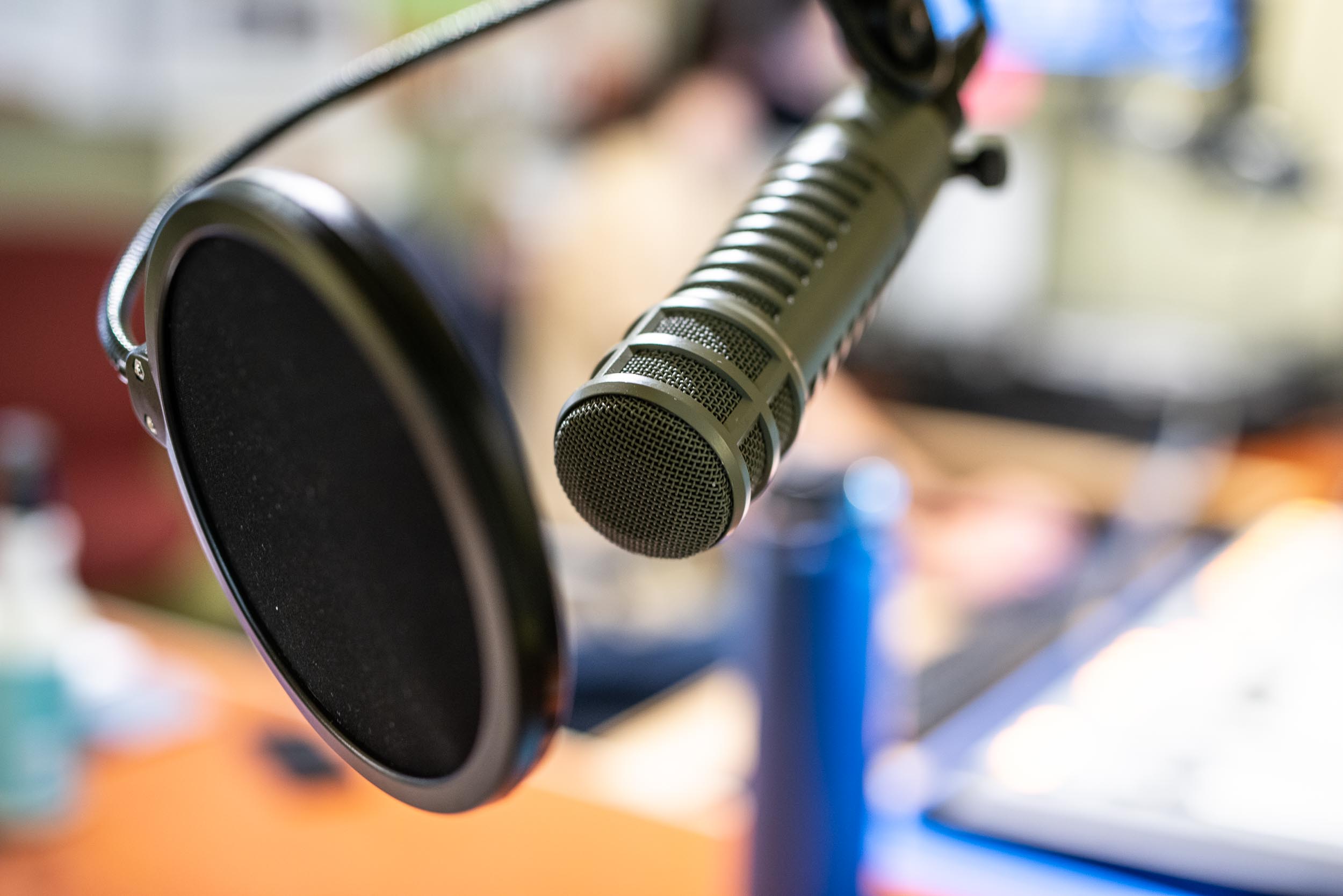
Q&A with DJs: Tgoss, Sage, Chris Tansey, Sadie Mayhem, Nichole Marie, Roin Dig, Wayne Birt, and Wendy Fox:
Q: What are the challenges to programming from home?
A:
-Kids.
-Lack of in-person interactions.
-Dogs.
-Quality audio.
-Not having a good mic.
Q: Who would you like to collaborate with?
A:
-A legendary performer who put out a classic album or two. Damo Suzuki comes to mind.
-It would be great to do something with Burna Boy.
-Diplo, because he’s down to earth, humble, talented, and likes tequila.
-I’d love to collaborate with DJ Sage again soon.
-Last year during Spring Radiothon, DJ Sage of Smoke & Mirrors co-hosted a 90’s throwback Femme Fatale with me. It was so funny and such a blast! I’d love to collaborate with Sage again soon.
Q: How about an encounter with a fan?
A:
-Being recognized by voice alone is typically surreal … Knowing that my show left enough of an impact for separate people in independent situations to say, “Hey, you’re that dude, high five!”
-My first phone call when my program was from 1-3 a.m. They let me know that they listened to my show every night. That really inspired me to keep finding music that had meaning.
-I walked in to a small clothing boutique where they know me and they greeted me by name. Another customer heard my voice and asked if I was the host of “The Rapture.” She said she listened while she worked as a home cleaner and loved my programming. It was very flattering.
-Volunteering out at Hermit Fest one year, a listener and I started talking and she realized who I was. She got immediately excited and kind of fan girl-ed a little, introduced me to her mom, and gushed a little about how much she liked my show as the sunlight danced through a tall canopy of tree leaves and flowers in the garden. It was flattering and humbling—knowing that the energy and feeling that I try and embody in each show was received and understood by this stranger by name, but not in shared space.
Q: How about an encounter with a musician?
A:
-While hosting a partially pirate radio program on my hometown’s college station (there’s a story for another day), our on-air crew caught wind of a hip-hop showcase on campus one evening just prior to our showtime featuring two prolific musicians from Minneapolis: Desdamona and Carnage the Executioner. My two co-hosts—Brew and The Top Civilian—and I found our way to their performance and ended up dominating the Q&A after Des and Carnage’s set. Surely catching looks from the many undergrads in attendance wondering what classes we were taking or if we were actually active students there (spoiler: we weren’t). The headliners came to chat us up as the crowd dispersed. We naturally invited them to guest on that night’s upcoming broadcast of the “4-H Club,” also known as the Hip-Hop Hype Hour. They agreed to visit us for half an hour, or two on-air segments, but we unexpectedly ended up hanging out live on the radio for over two hours. Live performances, an incredible freestyle session and insightful discussions of ‘name that tune’ overtook the regular format for one awesome night on the low end of the FM dial. Spontaneity is that spice!
-It was with Alpha Blondy, I was going to do an interview before his show. The show didn’t start on time due to a flight delay so I wasn’t able to do the interview before the show, but after the show he had me come backstage and said “I promised you an interview even if its 2:00 a.m.” He was a great sport and we had a great interview for my show.
Q: Any unusual moments on air?
A:
-If nothing out of the ordinary or peculiar occurs during a single episode of Forces Of Obvious Luck, did the show actually happen?
-It was when doing an interview with Ziggy Marley, I was asking questions about his music and what inspired him to write new songs after all these years. There was a long pause that seemed like forever in radio; it was 2 minutes of silence. I was thinking did he hear the question? Should I ask again. Then finally I got a reply, “The universe.” I thought, after all that silence, “The universe,” that’s the answer.
-A few years ago I did my top 10 albums of the year and the whole show was perfect timing to the second. It ended at midnight for the New Year and I did a final countdown that was somehow timed out perfectly without any premeditation, it was amazing and unusual.
-Silence. Any of it feels like complete and total freefall into the abyss …
Q: Describe a meaningful day (or night) in the booth:
A:
-When you feel the community crackling with responses. You play a song, you feel you got the vibe right, and you look at your texts and your chatroom and someone felt the same way.
-When I was able to have Vieux Farka Toure in the studio.
-I curate my playlists very carefully, intently, and heart-driven. The meaning I feel and hope the listener feels are deeply encrypted in the music. Every song is a piece of a puzzle that I somehow put together to make my playlists every week; another unique, multi-faceted, and purposeful audial experience that’s shared between me and the listener, which is intimate. In other words, it’s all meaningful and I wouldn’t be doing radio or volunteering if there wasn’t a deeper meaning to it.
-When I recorded my show promo shortly after starting as a programmer. That’s the day I met my future husband. He made me laugh. Still does every day.
Q: Tips for would be programmers?
A:
-Anyone can be ‘normal’ or ‘average’ without much effort, and that is beyond boring: see Top 40 radio and another droning Drake song. Embrace your inner oddball and fit in by standing out among all the other unique characters. That’s what makes Radio Boise such a funky family.
-Dig deep, be curious. Allow for the idea that what you like now could be very far from what you like in the future.
-It’s okay to make mistakes, just smile and move on. The most important thing is be confident and own your music choices. Love what you do.
-Get involved. Volunteer. Talk to us.
-It’s not enough to have made a few really great mixes that you shared with friends over the last few years. Having a weekly free-form radio show means that every week you start fresh. There is no time to get extra precious about every tiny detail of a transition, although when you nail a tricky one live-on-air, it’s exhilarating … your life becomes the raw material to support the emotional space a show explores.
Q: Other passions besides radio?
A:
-Ultralight backpacking on ridiculously long trails.
-Giving back to the less fortunate kids in Africa.
-Music, art, food, anything that engages creativity.
-I am pretty passionate when it comes to issues such as women’s rights and liberal issues.As programmers, we are advised not to talk politics or controversial issues on air, so I express my views and opinions through music, especially punk and riot grrrl bands.
-Hair, music, and love.
-In the quarantine, I’ve really doubled-down in finding solace in working in the yard.
-Magic the Gathering.
Q: What is a victory for you:
A:
-Getting back into school after 30 years to pursue a B.S. in Audio Production.
-My greatest accomplishment is my daughter, Mini Mayhem (who sometimes joins me on air). And I think just having a radio show for almost 9 years on Radio Boise is a victory. I’m one of the longest-running programmers and many didn’t think Femme Fatale would last this long (since I only play female artists) but thanks to support and the thousands of woman putting out great records every year, Femme Fatale continues to reach new listeners.
-Surviving through the turn of the crisis, I’m so proud of the Radio Boise team for not giving up.
-I became Radio Boise’s Music Director in March of 2018.
-Pulling in over $500 for a radiothon show after 10pm on a Monday night, on a community radio station, to me, is an accomplishment.
Q: When did you know music or radio was going to be an important part of your life?
A:
-Elementary school.
-When I filled out my show proposal for Radio Boise, it was a turning point in my life.
-Since I was a child.
-In college at University of Moscow.
-Music has always been a love.
-In the early 70s.
Q: Who / What inspires you?
A:
-Committed people who are not concerned with material comforts. People who pursue vision when on the surface it’s the most irrational thing you could do. Jeff Abrams, founder of Radio Boise, was one of those people.
-My family first and foremost. Music inspires me also with ideas, motivation, and inspiration.
-I’m always searching for the deeper meaning of things, whether that be the words of people or the forms of things. That’s why music is such an important tool for me. It allows me to navigate the thoughts of great minds and visualize unusual forms without having to leave my house!
-Kathleen Hannah of Bikini Kill/Le Tigre/The Julie Ruin. She has had to overcome misogyny, hate, and illnesses to make her voice and other women’s voices heard. She is a pioneer of women in music.
-A great beat, fun baseline, clever lyrics, and a unique perspective.
-Wayne Birt, for his drive and dedication to making Radio Boise sound the way it does. Over the year, it’s evolved into a station with a voice, a presence, an impact. His background in writing, his deep knowledge of music, and his strong internal compass of ethics and grit make him one of the most important people in the stations story. He inspires all of us to be better, and not to win and dominate, but to keep personally stretching a little beyond what we think we can do. Much respect.
Downtown Boise
May 27, 2020
This interview has been edited and condensed for clarity.
Creators, Makers, & Doers highlights the lives and work of Boise artists and creative individuals. Selected profiles focus on individuals whose work has been supported by the Boise City Dept. of Arts & History.
